#all of them are an absolute joy to use and have their own tonal character that sets them apart from similar vocal synths it's great
Explore tagged Tumblr posts
Text
SO excited for synthv nyl... true alto vocal synth my beloved
#am.txt#THEY LOOK SO COOL TOO...#once they're out i Gotta draw fanart for all four main eclipsed sounds vocals i adore them truly#all of them are an absolute joy to use and have their own tonal character that sets them apart from similar vocal synths it's great
3 notes
·
View notes
Text
3 Shadowgast fics that made me ugly cry
Okay so I read a LOT of shadowgast fanfics and I wanted to share some of the ones that made me absolutely weep. (I was going to wait until tomorrow but I got too excited to share).
All of these have some intense emotional distress, but I promise you all they may be angsty but they absolutely have happy endings.
They are all set in very different AU's, are hefty completed fics, and have similar feels!
1. the breathe before the phrase
(171513 words) by @kmackatie Chapters: 20/20 Rating: Explicit Summary: The ringing note of a concert A is played by the oboe, echoing on its own in the space. It’s picked up by the wind section, followed rapidly by the brass, and the familiar feeling of an orchestra calibrating takes over Caleb. The tonal adjustments as each person brings their instrument into alignment sinks into him and something inside Caleb shifts in recognition as Essek leads the strings into their own tuning. It’s like something is waking up, like something unfurling and firing across long-unused paths of memory. His hands shake slightly, as he raises his bow and joins them, fingers fumbling against the pegs and fine tuners that give him control over his instrument. ---- Essek Thelyss is a leading violinist, his spot as Shadowhand of the Rosohna Philharmonic Orchestra has been uncontested for over a decade. Caleb Widogast is a recent arrival to the city, convinced by his friends to audition for one of the vacant violinist positions. After starting off on the wrong foot, Caleb and Essek get to slowly know each other, discover what brings them joy, create while defying expectations, and find out that what they can produce together may just be better than anything they can do separately.
Why I cried: The amount of pressure put on Essek made my heart absolutely shatter. That plus the pinning between Caleb and Essek had me weeping. The hurt/comfort energy. The bad parent Dierta and of course past Caleb Ickythong trauma healing. Other than the story itself Katie has put so much energy into explaining the music, the playlist is stunning, and the inspiration for the played pieces in the fic are grounded in actual compositions. No spoilers, but the ending is gorgeous <3
2.Till Human Voices Wake us
(66080 words) by @ariadne-mouse Chapters: 23/23 Rating: Teen And Up Audiences Additional Tags: Merman!Caleb, no Mighty Nein but otherwise canon setting/events, Neutral evil Essek, Essek-typical anxiety and fatalism, Loneliness, Hurt/Comfort, spooky gothic vibes, some horror and disturbing imagery, the ocean as a threat/love language, Illustrations, drowning themes Summary: Essek Thelyss, lonely and ambitious prodigy, comes to Nicodranas to make a risky gamble with the Assembly. At the water’s edge, he finds himself swept up in another dangerous entanglement he can't seem to escape — and as time goes on, he's less and less sure he wants to. Will his treasonous alliance or the sea itself devour him first? (Or, the one where Caleb is a merman.)
Why I cried: okay so look, this story was so fucking sad I can't even begin to describe it. The love and longing between the two, the tragic backstory for Caleb. Treason = death for Essek (it's a happy ending though so do not worry, but I definitely worried so you don't have to LOL). It also has some stunning art in it!!!
3. what luminous worlds await
what luminous worlds await (178674 words) by @essektheylyss Rating: Mature Additional Tags: Champion of the Luxon AU, Alternate Universe - Future, Space Opera, Religious Conflict, religious trauma, Violence, Minor Character Death, Implied/Referenced Self-Harm, Dreams vs. Reality, Demisexual Essek Thelyss, Past Character Death, Grief/Mourning, Angst, Fictional Religion & Theology, Implied/Referenced Sex, Mention of Using Sex as Self-Harm, several immortals grapple with loss while trying to save the world, so so many liberties taken with consecution, this wouldn't be a problem if you'd EXPLAIN matthew mercer, and/or if a certain drow would give literally any straight answers, (I mean he can't give straight answers when he's not straight), Background Fjorester (Past), Post-Canon, …very post-canon Summary: “You seek my nature. It is a lonely endeavor. Would you like to join me on this path?” “Yes.” — After a thousand years, a divine champion awakes in a lightless cave above Port Damali with little memory to speak of and a beacon in his hands. Even as he struggles to piece the past together and process what he has lost while he slept, the future demands he answer for the crimes of his elders. It offers little in return, but perhaps there are fragments of possibility awaiting him.
Why I cried: Omg oh boy, this one made me BIG cry- honestly one of my favourite fics I have read so far. A true space opera, a story of love, in many forms, over time, space, and multiple lives. I sobbed from chapter one literally until the end. Though I think you will need an A03 account to read this one, but it is worth the wait to set one up. My partner watched me cry so much while I read this. I totally did download and save this fic to send to pals so they can cry with me. It is worth the agony for this happy ending. I might still be crying LOL
#for the shadowgast shippers#shadowgast#shadowgast recs#caleb widogast#essek thelyss#cr m9#mighty nein#critical role#honestly some of them I sobbed while explaining the premise to my partner because I have a lot of feelings#these are all worth the length
211 notes
·
View notes
Note
sorry if this is a repeating question! your posts got me interested in trigun, which one do u recommend watching first, the 1998 or the 2023 one :0? (i already finished the manga)
It's not a repeat question, and I love talking about Trigun!
Watch 98 first for sure. A lot of it is pretty close to the manga, with a lot extra. Stampede is more of a reimagining or reinterpretation of Trigun, and it's very different from both 98 and the manga. (Somebody correct me if I'm wrong, I'm not sure) I think that the Trigun 98 anime was created after the first two volumes of the manga, and the popularity of the anime got Trigun picked back up again for Trigun Max. The manga, the 98 anime, and Stampede are all really different works, and they all have their own individual merit. I've only read about a volume of the manga, though, I have to finish reading it.
98 is much more of a comedy than the manga, and the actual Plot (TM) of Trigun only really kicks in halfway through it and results in the most severe tonal whiplash I've ever seen in a show. The humor's a bit more 90s anime, the episodes get weird, and Vash is more heterosexual (anime polycule game on point). I've been chewing over the really interesting impact of how Vash's idiot persona is absolutely impenetrable for the first four-to-six episodes, to the point where the audience is given very little signaling or insight into how he's actually feeling or what he's actually thinking, and how putting that unfiltered whacky comedy next to the regular fucked up Trigun really changes the experience.
Stampede is great, but it spends almost all of its time on plot and worldbuilding and really misses a lot of the joy of just watching Vash be insane. 98 gives us a lot of time with the characters just watching them be insane and fuck around and spend time forming their relationships, and you feel that absence in Stampede.
The anime is much less of a fever dream if you've read the manga, but there IS a scene where Vash eats a salmon sandwich and talks about buying salmon sandwiches. WITH WHAT OCEAN, VASH? WITH WHAT OCEAN???
#trigun#trigun 98#trigun stampede#criticism of stampede: vash isnt bugfuck enough#upside of stampede: meryls more insane than ever#the impenetrability of vashs deal is interesting to me as a writer#trigun really re-iterates to me how my favorite method of longer-form storytelling#always involves a period of character focused comedy work to get me invested#and then more serious drama#just comedy and its not too exciting but just plot and i dont care as much about what happens to the guys#98 vashwood was JUICY in stamp its not there as much
43 notes
·
View notes
Text
Melo is My Nature Review
Well, as usual, I’m late to the party! I picked up 2019′s Melo is my Nature/ Be Melodramatic with some trepidation since I was (am!) still smarting a bit from the disappointment that’s Hospital Playlist S2, and I wasn’t quite ready for another.
I’m so glad I gave it a chance! While it isn’t a “perfect” series- in the nature of the world *sigh*- its combination of quirky, clever, self-aware humour and heartfelt performances won me over from the first episode.
More thoughts under the cut (along with some spoilers)
I’m very fond of ensemble dramas that love their characters, and “Melo is my Nature” does that very well. Perhaps a little too well, to the point that you feel the writers letting themselves be more than a little indulgent during the middle stretch of the episodes. But I can’t complain too much, because yes, I know the feeling! “Side characters” that refuse to stay in the lane and take over the narrative are also my favourites, as a writer and a viewer. I loved, loved, loved Lee Joo-bin as the flighty-but-amazingly-smart Lee So-min; that felt like such a delightful clap-back against the prevailing sentiment that often goes against young, successful women and the ridiculous levels of expectations of them, in how they need to perform gender and femininity and smartness. I loved that (like Emma! There’s a lot of Jane in this series!) the writers managed to make her likeable even though they never disregard her flaws or its consequences.
Another performance/ character that I totally adored was Baek Ji-won as Jeong Hye-jeong, the industry maven who may be (?) a nod to Kim Eun-sook, I suppose! I was afraid at some point that they’d just trash her character, by making her a little too ridiculous in an unkind way, but I found some of the loveliest scenes involved her- like the one where she tells Jin-joo to do the work, but not be too successful. In the end, there was a love and fondness for her, a genuine empathy, that really was core to what made this show so successful.
Shout out also to two of the weirdest characters I’ve watched, but thoroughly loved- Heo Joon-seok as Director Dong-gi & Lee Ji-min as Nutritionist (?) Da-mi. I absolutely adored that the only wedding in this series is between these two, and they do it in a completely predictably-unusual way.
Re: the “main” characters, I loved all of them without exception, though some more than the others :) One of the things I love about the show is how real and present the three female leads feel; they feel like whole, entire people rather than caricatures of them, even when the show reaches almost unusual levels of quirky. I love that a through-line of the narrative is how important women’s labour is- to themselves. The work they do, which is acknowledged as a part of their identity rather than just something they do to pay bills (though of course there’s acknowledgement of that aspect too!), their hunger to do it well and for it to matter- all of that is portrayed in a way that’s charming but still taken very seriously. And the way you know that its taken seriously is in the things they focus on- how Oh Jin-joo struggles to write alone, and how Han-joo’s learning to be someone’s mentor while struggling with her own insecurities, and how lost Eun-jung feels, when work which was supposed to give her purpose fails her in a time of crisis, and how unmoored she feels without it.
Re: the romance- I’m someone predisposed to dislike heterosexual romance, especially at the present moment, so it’s always with a great deal of hesitation that I start watching shows that I know have a large romance component. It’s always a bit of a coin toss for me whether the show will end up making me hate the romance or just about tolerate it. I rarely expect to *like * it. So “Melo is my Nature” was a pleasant surprise! This is one of the few series where I felt the writers put in the work to sell the “main romance” of the show. You get to know the Oh Jin-joo and Beom-soo in sharply etched sketches before they move into the romance part (with a lot of tongue-in-cheek meta humour about the formulaic nature of tv romances). I genuinely felt that thrill of “oh this could go platonic or romantic and I would like either” slowly ease into “oh my god these two are MEANT TO BE”, because the Romance is clearly in the all the ways they are NOT meant to be, but also, very, very definitely are. DELICIOUS. Just my cup of Jane Austen in a different context/ time.
Through most of the show though, my heart was divided between two characters- Jeon Yeo-bin’s stellar Eun-jung and Han Ji-eun’s pitch perfect Han-joo. Jeon Yeo-bin brought edginess, dark humour and a deep, almost- inconsolable grief to Eun-jung. Some of the stand out scenes of the entire series are hers: the moment where she watches herself on video talking to an imaginary person, and the moment she breaks down in front of the psych after talking about her mother. Watching this show, it really felt like- oh, she’s a star. Consider me sold on her for life (though, no, I will not watch Vincenzo unless there’s a Hong Cha-young supercut out there, in which case, please put it in my eyeballs now)
Han Ji-eun, imho, actually pulled off the toughest performance, because I think Han-joo’s strength of character is so often concealed by her “silliness” (in a similar vein to So-min’s), and that often makes her someone you’d overlook or not take seriously. But god, she broke my heart, from the scene in the first episode where she’s sitting alone at a table after a rough day and watching her horrible ex live his best life to the hilarious and excruciating “Oppa” scene, to the one where her kid is quite unconsciously cruel to her in the way kids can be. I was disappointed in the way they dropped the “reveal” about whom she’s dating in the last episode- not that I wanted her to be in an romance with Jae-hoon, god, NO- but it felt quite clunky. This is one of the two complaints I have with the show.
The second one is that starting from the middle, episodes began to noticeably feel like scenes/ sketches spliced together. Each scene is, within itself, perfectly written and performed, but the seams between the stories began to show. I felt one of the main reasons was that Eun-jung’s trauma tonally felt like it belonged in another show, but instead it had to get stitched into the mostly happy/ frothy storylines of the other characters. Sure, we had Hae-joon and his girlfriend’s terrible relationship, but the show had an easier time integrating that by way of Han-joo.
That said, I love how clever this show is! I love that it loves its own cleverness and can’t resist the urge to show it off- from all the meta references, in-universe jokes, and oh, that entire episode devoted to farting, complete with a song about it, which I think maybe my fave episode of the series. A great look at the place of performance in intimate relationships (and how the women bear the burden of it more than the men), but coming at it from a place of compassion and humour rather than anger. Love that choice, for the show and us!
I think @rain-hat mentioned in a comment here or twitter that Melo feels like a part of a triangle of shows along with Run On and Search : WWW. I’m inclined to swap out Run On for Rookie Historian, or huh, maybe change the triangle for a quadrangle? Rookie Historian dares to imagine a past where our protagonist is (mostly) unshackled by the patriarchy and in the “modern” ending to its main heterosexual romance, reminds us that people have always found ways to find joy and thrive outside the rigid bounds of society. Search: WWW goes about it in the opposite direction- placing us in a present/future where the patriarchy doesn’t and hasn’t ever mattered. Melo, I think, doesn’t quite do that, but in common with both these shows, it refuses to focus on the trauma of living under such structural violence, and instead talks about how we all (irrespective of gender) can find a way to remain unbroken by it. And while both Search:WWW and Melo do well at queer-platonic relationships as an alternate to the heterosexual project, it’s Run On, I think, which goes furthest there- firstly because though ostensibly structured around a het romance, that romance turns out to be falling in love with yourself/ loving yourself; secondly because it’s most explicitly queer in the choices that the characters make and the lives that they choose for themselves- Min-joo & May are each others darlings and will be for life, Yeong-hwa and Ki Seon-gyeom are allowed a tenderness in their friendship that feels like an explicit repudiation of toxic masculinity, and of course, you have May being asexual, but not aromantic, and Goh Ye-jun’s whole arc of accepting himself as a gay man, and finding acceptance of that identity from others.
Anyway! tl;dr would recommend (and have recommended!) Melo is my Nature to anyone fond of women, clever story telling and also ridiculously happy songs.
#kdrama#melo is my nature#be melodramatic#i gotta build a master list of my reviews#if only to save myself from tag and search misery#i'm a queue for you
42 notes
·
View notes
Text
Headcanons and Musings of Pirate-y And Plunderous Proportions: Astarion Says What
Synopsis: Random musings and ramblings regarding and spawning from the differences between how Astarion says just one word, depending on your choices—“What?” This got very long and touches not only on Astarion’s difference in presentation in aforementioned moment, but also some discussion-thoughts to chuck onto the dashboard regarding some other elements of Astarion’s content thus far in Early Access, and some thoughts to add onto others’ speculations and wonderings (I did not save sources so pardon the lack of proper citation, oops. We’re going informal here anyway.) Spoilers for Chapter 1 BG3 scenes, plot, etc, under the cut in case someone hasn’t filtered out the tags. Trigger warning/content warning: some discussion of heavy topics is mentioned and explored, including starvation, abuse/torture, and trauma. Other topics of note for summarization include speculation on Astarion’s largely unknown as-of-early-access background and a touch of his possible pre-vampire morality leanings, possible mental state/trauma reaction in a couple of scenes, and vague speculation on Larian’s gameplan for Astarion’s arc ending. Gather thy party and venture forward, for here be dragons and lots o’ text, matey! [/stereotypical pirate accent]
“What?” Just that one word, between the goblin party and the tiefling party. If Larian keeps the body language and tone presentation more or less where it’s at now in Early Access, they are worlds apart and delightfully up for interpretation of just what’s going on in our favorite vampire spawn’s head. This won’t be an in-depth post about all the tonal and body language differences, just picking out a few due to personal constraints (ie too broke to buy this game currently.) Edit: And also a lot of other thoughts and ramblings tacked on, lol. On the one hand we have him at the goblin party, where he seems much more superficially comfortable there, knows what’s going on and knows what to expect—it feels like he’s done this kind of scene a hundred times before. The comfort of familiarity. Did Cazador throw “parties”, much like how he “invited” Astarion to dine with him? I wouldn’t be surprised if he mingled at regular dinner parties either before his turning, or perhaps after when he’s ordered to hunt for Cazador’s evening repast. I doubt the goblin party has anything as potentially horrific as what Cazador would have lined up on the nightly basis, which is why Astarion isn’t aggro’d: he’s in a position of power at this party after all, not a powerless one. A conquering hero, as he describes the MC. A Precarious position, as it turns out.
Circling back to that one word though, the way he says “what” in that scene after he propositions the MC and the MC picks the “Maybe. If you say please” line feels like Astarion’s response could be interpreted as pretty abrupt. On guard, perhaps, squaring up, offended, even perhaps lowkey challenging/hostile. Expressing social displeasure and possibly staring down the MC mayhaps? Could be, especially if Astarion’s body language remains as it is rigged now in-scene with that step forward, his shoulders shifting, the lack of a smile, that assessing glare, all combined with that flat tone of voice. The animation could just be temporary and subject to change, but if it does end up as more or less the final version of that moment’s depiction, it’s pretty interesting as a shift. I’d read it as potentially “not actually truly comfortable in this situation, just familiar and numb to it all”, especially when combined with some of his other earlier potential lines at the goblin party, such as the following: Astarion: So, what are we drinking to? Other than a pile of corpses. MC: That’s not funny. Astarion: Oh don’t be so sour - It’s a party. You did what you had to. Don’t be ashamed that you did it well. MC: I wish things had turned out differently. Astarion: And I wish I was drinking out of the skulls of everyone who’s ever wronged me. Life is tough. Although that’s not to say we can’t have a little fun. This supports the whole “has been through his personal hell and has adapted to survive it albeit not unscathed” story Larian seems to be going for with him quite nicely in the little tells and details. A sort of “take what joy you can even amidst the dark situation surrounding us” trauma-induced adaptation, coupled together with actual enjoyment on his part for killing. It’d be easy to say Astarion is moreso in his element at the goblin party, and to a degree he is—it’s one he is well practiced with in his current mindset. Compare now how he acts at the tiefling party—we can all agree he’s not having a good time, our friendly neighborhood vampire sulking in particular over the fact that “there’s a worm in [his] brain, [he’s] surrounded by idiots, and all [he] has to drink is wine that tastes like vinegar.” But the delightful thing is he’s complaining so vividly about it. The wine likely is worse at the tiefling party, seeing as they’re refugees, and the goblins had previously captured a duke whom they likely stole loot from and under orders from Minthara et al stored said goods elsewhere for a later date (likely some of said goods were consumed at the party if it happened. Edit: Shadowheart’s drunk dialogue at the goblin party mentions the goblin’s wine there being good, poor dear. Fascinating hints at her story and character in that scene though.) This is assuming Astarion is drinking wine at the goblin party, of course. He may very well be drinking something red and full-bodied there, just not made from grapes. But even in his complaints and presentation, he seems arguably more relaxed and less on guard compared to his demeanor at the goblin party. Let’s be honest, he doesn’t view goblins as equals or stimulating company judging by his various voice lines expressing his disdain, distrust and overall low opinion of them as vermin among other things. The fact that he’s willing to call the tiefling refugees idiots while in earshot of them? Definitely doesn’t respect them as a group—though he has a less negatively opined line regarding them earlier on if the caged goblin (Sazza) is killed,—which is not surprising given that MC and company at the time of the party just saved them from certain death. Astarion’s reaction however also reads as potentially at ease enough to say what he’s thinking. He’s not going to get murdered for saying so, and there aren’t any punishing power games at play with the refugees and do-gooders he’s found himself surrounded by. There aren’t any hedonistic shenanigans going on and the drinks are terrible, so it’s not an entertaining party for him, but one could make an argument that Astarion might actually be feeling more secure or at least less threatened-as-is/was-his-accepted-ongoing-norm there. Which might mean he’s feeling quite out of place, or even just not...entirely engaged with what’s going on around him and even within him as far as emotional states go. Would he casually pull the same stunt at the goblin party? If you’re a bastard to him, yes, but that’s not in the same emotional vein as his dialogue during the tiefling party at all. Loyalty from the goblins is fickle, the goblins worship the Absolute and those that are chosen by the Absolute—so long as said Chosen remain powerful enough to subjugate them and is in favor. Astarion knows this kind of power structure well: ruling by fear and power. With the tieflings? It’s not superiors-and-subordinates, it’s just...people. People celebrating surviving an event that could’ve very well and most likely would’ve ended in their deaths. Will he get to celebrate like that one day? That could very well be a painful and bleak thing to consider, and not something he wants to contemplate as of yet, based on his dialogue lines that demonstrate his fear of Cazador. How’s he supposed to get lost in the fun and revelry if the wine doesn’t even taste good to him? I don’t know wines, but I’m guessing from what little I do know and what I’ve read of flavor descriptors for wines hyped as good, it might actually be bad wine based on the adjective “sharp” when mixed with the rest of the description if the MC takes a sip. Sharp seems to suggest too many tannins, or maybe improper storage so the wine actually did turn to taste a bit more like vinegar, or maybe not enough sugar in the grapes used, perhaps? To be fair, I do believe there’s a non-conversation line somewhere of Astarion’s regarding solid food tasting terrible to him, but I can’t verify that so a pinch of salt there. Still, if his taste buds are aligned with regular living mortal ones for wine at least, RIP Astarion, he’s stuck with a terrible drink for the foreseeable night. Unless, of course, you know. ;D Compared to the tieflings, the goblins as a whole? As a group they’re a scraped together army of pillagers hungry for destruction and spoils. They don’t have ANY loyalty to you—in addition to being willing to betray you via murder immediately despite working with them when Sazza first brings you back to meet Minthara, there’s also when Minthara potentially opts to try to kill you post-goblin-party. If you persuade her not to, Minthara does mention “do not return to the goblin camp, as far as they were concerned you were destined to die tonight.” This is not a group to get chummy with, obviously. Doesn’t say good things about the Absolute’s followers in general, either, or the Absolute depending on if Minthara’s being honest about the Absolute intending that the MC dies after razing the grove. Minthara could just be lying to serve her own ends and is out to destroy any rivals for the Absolute’s favor, after all, I can’t verify that from dialogue exploration at present. So it’s not surprising that this is not a group Astarion is going to let his guard down around I’m sure, or around an MC that sided with the goblins, because fortunes can shift like the wind in a scene like that, and I think his utter lack of surprise at Minthara trying to kill you all (whether or not the MC had a romp with her) is potentially spawned because he recognizes this fact. He’s been here before, in another time, another place, with different faces, but he’s seen this play before. And the MC is just another face for the same old role of a player in this rat race for power when they side with the goblins, aren’t they? The difference this time though is: will they succeed and make it to the top? Is Astarion betting on the winning horse, or not? Far less reason and far more motivation to not be emotionally invested in anyone or anything around him because it’s survival of the fittest, and the most ruthless will be the ones who win—the MC just reinforced that perspective for Astarion, in slaughtering the tieflings. But Astarion isn’t fully corrupted yet, despite however much Cazador has twisted and tormented him so. Isn’t it fascinating, that the MC, one of the first people Astarion can actually interact with relatively freely without Cazador’s puppeteering influence hanging over him quite so acutely, is someone who might very well and very likely will have a huge impact on how Astarion develops and sees the world? For better or for worse, the MC will shape all the companions’ futures and perspectives it seems, depending on their choices. On a meta note, isn’t that thrillingly fascinating and engaging work by Larian Studios? Bravo, honestly. Continuing, for Astarion this could very well just feel like a better but complimentary and thematically continuous segment of the nightmare that is his existence under Cazador as it goes on: he’s a vampire now, and the world is only ever a power struggle between the strong and the weak, and he knows better than to ever be weak again. Kindness and virtue belonged to Before. Before he died, before he turned, before he was taken. Those are things in stories and fairy tales now, that belong to other people, other places and times, other lives—things that belong to the living, not the undead. Sentimentality, more universally-accepted morality, all of those Good™-aligned or softer feelings can feel like they have no place in his world now, on this darker path. But he knows what they are, not just in theory I think, but also perhaps knowing from memory and experience, however distant and faint. The way he speaks on many occasions has subtext that could very well suggest he wasn’t without a better side through implication and emotion. Which is not to say I think he was a shining paragon of virtue before he died—guessing based off of the dev team’s writing of him so far, I’m expecting nuanced and complex but ultimately very human (or elf if you’re being fantasy-based technical) morality with both merits and flaws, for polarizing opinions in the fandom. That being said, I’m holding off judgment on what kind of person he was before he was turned for now despite reading about pre-early-access, preliminary ideas the dev team had for his background. The reason I’m waiting to see what the dev team puts into the game for his backstory of Before, is because some of his datamined lines could be taken in a couple of different ways, and some of his emotional responses as is currently don’t track as truly Machiavellian or I’d say malevolent in nature for manipulation or otherwise. Granted, not all Evil™ acts stem from intentions to be malevolent. Sometimes people do evil both in-game and in life without really intending to, or recognizing that they do, nor seeing the harm they have caused or will cause (I’m looking at you, Mayrina.) Manipulative yes, but so far it’s looked like it’s for defensive purposes in a world that is out to hurt or kill him if given any opportunity whatsoever. Personally I actually wouldn’t even say he’s been really manipulative at all, but your mileage may vary. He lies because he’s afraid you’re going to murder him for being a vampire, and because he doesn’t want to reveal the cause of two centuries’ worth of trauma to someone he just met and likely can’t predict if they’re emotionally safe for him to interact with. Note: “emotionally safe” does not necessarily denote being sympathetic here, so much as “will their response cause me pain in some fashion?” from Astarion’s point of view, which does not necessarily require the MC to be mean to him though obviously that wouldn’t help. We touch upon why sympathy can hurt later on in this essay. And why would he expect sympathy in the other instance, regarding revealing that he’s a vampire? How often would we not murder strange vampires we just met in DND-worlds? Is that not a common response and practice in Faerun for the most part? They’re on the list of acceptable prey for a monster hunter to be kidnapped and taken to who knows what fate (probably nothing good we’re sure), and who would come rescue them? In all actuality: No one. If he wasn’t a companion he’d easily just be one more random encounter to kill—as he and all the companions are in the right circumstances, *cough cough* like when sacrificing anyone to Boooal *cough.* Astarion’s had little cracked moments where he seems to be showing genuine vulnerability, and I’d say he likely displays real genuine emotion plenty of times, just not all the time. While the vulnerable moments could be a ploy, were he the type to actually be fully acting, I’m disinclined to bet that he’d act in the way he does during those moments if he planned them out or even improvised. It could be a mix of both, where it’s both true but also an act of manipulation. Were it the last option, that would require more exploration of his character in various situations to determine imo. I still doubt that though. I think he’s a little too raw and real in his pain, anger, and aggression to say he’s being malevolently manipulative at the end of the day, at least thus far in chapter one. The MC’s choices may change and influence that, on the Evil™ route. I’ve been following some of the fantastic dash discussions on Astarion’s reaction to when the MC tries to comfort him (because of course I have, I’m here for BG3 content and Astarion content especially, aren’t we all here for the same party in his tag? Also hello fellow Astarion stans! :D I hope everyone’s having a good day), and if some of these datamined lines from Pjenn’s blog post are actually implemented and kept as canonical [link], specifically the ones Astarion says regarding heroes, I do think it ties in very strongly with some of what other folks have said regarding his recoiling reaction. Copy-pasted the potential dialogue lines of interest below: Astarion: Heroes. |said with disgust| Astarion: Heroes had two centuries to save me from my torture, but not one came knocking. Astarion: The strong had two centuries to pluck me from torture, but no one came. No, it was the mind flayers that rescued me. Astarion: I spent centuries as the victim of a corrupt man. It was the mind flayers that plucked me away from that. I very much enjoyed all the takes on Astarion’s potential motivations in his response, and I do want to chuck another idea into the fray that supports the vein of ideas that have him being truly afraid and then angry at the MC in that scene, with the speculation including those possible hero lines above as influence. Specifically, I’d like to bring in an outside comparison to part of Molly Grue’s reaction to seeing the Unicorn from The Last Unicorn animated movie for the first time, transcribed below: The Unicorn: I’m here now. Molly: [Bitter laugh] Oh? And where were you twenty years ago? Ten years ago? Where were you when I was new? When I was one of those innocent, young maidens you always come to? How dare you. How DARE you come to me now, when I am this. [begins to cry, heartbroken] Consider Astarion being shown kindness when he is now away from Cazador, not fully free or safe yet but not currently actively fully suffering Cazador’s torment all up close and personal. Consider that only on that very night before he was snatched up by the mindflayers, which might’ve been anywhere from only a day to a handful of days before this conversation about his nightmare, he was going out to falsely smile and lure some innocent—(“No innocents. You have my word.”)—or perhaps not so innocent, beautiful soul back to Cazador’s mansion to very likely die or be turned. How often must he do so? Is it every night he is ordered to go out and condemn someone else to that unfortunate fate? Do you think Cazador killed them cleanly? Quickly? Why would he, instead of agonizingly grinding out any last traces of sympathy his spawn might have through the guilt that they are the ones who “choose” who suffers and likely dies at Cazador’s hands that night? To give the illusion of choice is one abuse/torture tactic that can be used to break a soul that we see often in games: choose who suffers or dies. Cazador is unquestionably a personality who enjoys the psychological aspect of tormenting his victims, as evidenced by giving Astarion the “choice” to be either flayed or to “dine” on a rotting, dead rat, as well as other mentions of how he puts thought into torturing those around him. Astarion is still so fresh from his torment,—torment that is still technically on-going with the very real threats of resuming once more—he is emotionally bleeding enough arterial blood at the seams to fill a sea. His actions, words, and emotions so often metaphorically smell of blood, and not because he’s a vampire and the traditional role of a vampire being a predator among humanoids ironically enough, but because being a vampire spawn means Cazador. And Cazador means horror. Astarion has survived, yes, and it’s been hell. He’s still in hell, because he isn’t free yet. Not truly. It’s a desperate gasp of air, this taste of freedom, to dream that he could be free of Cazador. Imagine his feelings when he’s now in something like freedom, a reminder of what could be, what his life might’ve and likely was like once upon a time, an uncertain here-and-now where he has the possibility—just a possibility, and an unlikely one at that for most ordinary or less-than-ordinary people, not a certainty—of being free, and he’s just admitted to the horror that is Cazador. Admitted in this moment how much Cazador frightens him, how much just the thought of Cazador frightens him, how much the possibility he might be sent back to his master and having his previous tormented existence resumed truly frightens him. And the MC reaches out in sympathy. In acknowledgement that what Astarion has been through is horrifying. To look at this horror and say it is pain, and terror, and awful, that it isn’t normal. It isn’t something to ignore. It isn’t something to pretend is just everyday same old, same old, to numb and take off the edge as much as one can. That Astarion’s pain and fear aren’t to be sought out for entertainment or at best to be willfully neglected in an act of malice. That stark moment of contrast, like night and day, could bring the pain of two hundred years crashing down inside his head, all compressed into one moment. Feelings he tried so hard to survive through, ignore perhaps, suppress: fear, helplessness, loneliness, misery, anger, sorrow, hatred, pain, anxiety, distress, need. Memories, of so many instances that hurt in that moment and then continued to hurt for so long afterwards. How much must it hurt him, wound him, to lift his head for air and have a perspective outside of his suffering that is sympathetic...but knowing that nobody came to save him. That perhaps, no one ever will, if he loses this so-called freedom and is dragged back under. That those that care, cannot help you. And that those that can help, do not care. Why would anyone help him at this point after all? He’s a vampire spawn. A classically defined monster in the eyes of society, and he knows it. (”I’m not some monster!” / ”At best, I was sure you’d say no. More likely you’d ram a stake through my ribs.”) He must have been truly desperate in his starvation to chance anyone finding out he’s a vampire in the party. Not surprising, he can’t rest at the end of the day like the other companions can. He has to expend extra energy at that point to find food discreetly after fighting all day, and subpar food at that. (”Animal blood tastes like muck.” verification needed, it’s a conversational line in some branch of the morning-after he asks to bite the MC the first time) He’s not eating breakfast, snacks or lunch during the day, and he isn’t guaranteed to find food while hunting in the woods. Game might be scarce, he can be wounded or exhausted after a long day of fighting, and he wasn’t starting out in the peak of health to begin with either. He is a vampire spawn yes and apparently can take down large game such as boars to drain them, but that is a rough existence to condemn anyone to mechanically speaking. He knows what he’s risking, regardless of his int stat. But he takes that risk anyway. The character who is so survival driven, risking a very high likelihood of expulsion at best or death as the much-more-likely worst outcome of this attempt? His bite isn’t painless, and pain can wake a person up readily enough if they aren’t a deep sleeper, and how deep a sleeper are most people when in an uncertain and unfamiliar wilderness, potentially while hungry and cold, with the fretting fear of a agonizing death looming over their head? Even accounting for a lack of mental clarity from hunger and exhaustion and other factors, I find it deeply unlikely that Astarion is unaware of how big a risk he’s taking with the odds are stacked against him, rogue class or not. And even if he’s just thrown out of the group? He’s alone. Vulnerable. A target to be hunted by a much bigger, meaner predator. One that won’t kill him quickly, we can guess. His odds are much lower, on his own. Specifically his odds of not being dragged back to Cazador...assuming the MC doesn’t just turn him over to Gandrel. How terrifying is it to imagine that your suffering will never end, to be told it will never end, and then you are reminded of what it is like to not suffer for a time. To have felt the painful hope that maybe there is a possibility that you could escape an existence of torment...but knowing you very well might not? It is desperately bleak. It is no great leap of the imagination to hear Astarion saying—(or more likely thinking because this would be terribly vulnerable...but he might say something when pushed because he’s so full of sharp edges and bleeding insides still)—something similar to Molly Grue’s line in his own fashion, is it? Astarion: “[Bitterly laughing, mockingly so. As he speaks his tone breaks, an edge of raw, desperate hysteria slipping through, attached to centuries of pain turned to anger] And where were you two hundred years ago? A hundred years ago? Where were you when I still desperately thought in the deepest parts of my heart that someone might come? When I still had hope? Astarion: [his voice turns low and venomous, raising in volume and accusation before finishing with a break on the final word “this”, a tonal admittance of how distraught and self-aware he is of what he’s had to do, of what he’s had to become to survive] How dare you. How DARE you say this to me now, when I am this.” (the above lines are entirely fictional and are not from any in-game, data-mined, or otherwise official source or content) He’s been made to do so many terrible things, even just based off of the few lines we have heard in early access he’s been through so much horror. An hour of torture, a day, a month is so incredibly long. It can have such lasting impact on a person—PTSD, as we know it in this day and age. A year? Five years, ten, twenty, fifty, a hundred? An elf he may be, but from a human perspective...he’s been tortured for lifetimes. Even as an elf, two hundred years is a long time. More than long enough to seriously alter how someone’s brain works—people are both amazingly resilient, but also so incredibly fragile. Cazador has had all this time to play with Astarion’s brain, honestly I find it impressive Astarion has any sense of self left after all this time. That he’s still driven to survive, that he still feels anything at all. (”It doesn’t look broken. But then again, none of us do.”) It doesn’t surprise me that he’s intensely bitter when encountering the “paladins” of Tyr—(ie Anders and company if you know who I mean—and was that a Dragon Age 2 reference? If not that is an amazing coincidence with the whole Anders-Justice-Vengeance-Demon thing there)—if the MC asks something to the tune of “Don’t you wish someone had helped you when you needed it?” Oh. Oh that had to be a painful question for him. Astarion had his basic needs denied and abused, to ask if he wished that someone had helped him when he needed that and more, and no one came? Why was he denied but the paladins get help? Why does he have to be the hero when no one came for him, when no one very well might come for him when he might still very well be in dire straits in the near future? I can see the possible desire to inspire sympathy intended in the question from the MC, but it can be so utterly without sympathy to ask that in some contexts, and in Astarion’s case it is. He was being abused and controlled without any way out—Anders and his cohorts opted into the deal with Zariel for personal reasons, not as far as I know under threat of imminent death, and they are relatively capable of fulfilling their end of the bargain barring their current injuries at the time. They certainly have more freedom of choice than Astarion and other vampire spawn ever did, and they were not being tortured right then and there. Warlocks, referring to Anders and co., might even have the option to get out of deals, a la Wyll’s personal questline hook thus far. Astarion can’t get out of his servitude from Cazador. Cazador holds all the cards, makes all the decisions, has all of the power. To compare Astarion’s situation to his face with that of the “paladins”? I’m surprised he wasn’t spitting fury, honestly. They still have normal elements to their day to day life, despite their devil’s deal. They are not being tormented on the daily—yet. They are not in hell—yet. They can get out. They have the possibility. A possibility Astarion didn’t—until now. And isn’t that the most fucked up thing, that it wasn’t a force of Good™ that saved him, but an even bigger monster than Cazador himself? He was saved—by mindflayers, intending some fate that was likely worse for him than before. Even when the Absolute’s hand begins to be revealed in all this, he is still a pawn among monstrous masters. What heroes there are in the world, won’t come for him. They never did before, and they didn’t now. Heroes are for other people, for realities aside from his own. They are for other people, living Other lives. Not his life. Forces of Good™ swooping in to save the day, to correct the wrongs of the world and to make things Right™ just isn’t his normal. Not anymore, if ever it was. His normal was warped by Cazador a long time ago. Is it a stretch of the imagination that if Cazador twisted “dinner” to be a choice between consuming a rotting, putrid rat corpse or being flayed on a nightly basis, turning “poetry” into the memory of a “sonnet” carved into Astarion’s back with a razor over the course of an entire night full of Astarion’s own pained screams? Is it hard to imagine that Cazador also took pleasure in turning other ordinary situations one might encounter in normal life into nightmare versions as well for Astarion and his other spawn? One illithid mind-power option shows Cazador controlling Astarion by holding his chin, though without any further context. Cazador wouldn’t have had to do more than that to invoke terror, after a certain point in time. It seems highly unlikely the gesture wasn’t followed up with more pain, though. Perhaps in that moment when he speaks of his nightmare in the first conversation and the MC reaches out to him in sympathy...Astarion was reminded of something. Multiple somethings, multiple moments, when Cazador reached out to him oh so casually, and it ended in pain and terror. The way the camera is framed as of the current time in early access, the way he flinches away crying “No!” so quiet and low, his eyes wide and staring just so, how he goes so far as to pull back almost entirely out of frame and the camera slowly pans to follow him? Perhaps that is just a stand-in scene, but as it is, even now, it emphasizes that he is I would argue genuinely afraid, and reflexively responding in what is likely his first opportunity to freely respond to his traumatically induced fear. The first opportunity where he wasn’t supernaturally compelled to do exactly as Cazador ordered him to, the first opportunity where he was likely not going to be tormented further for expressing his fear, for having his main tormentor laugh and delight in his distress. The first instance where he for a split second let his guard down, and didn’t expect to be hurt—until the MC reached for him, echoing possible memories of what happened last time someone (Cazador) did that. It’s not Cazador reaching for him. But...it is not Cazador. He doesn’t have to worry about Cazador hurting him right that second, but...will the MC hurt him, like Cazador did? Will they make it look like they’re going to help him, that he can trust them, and then betray him? (”How can you be so cruel?” / “It [Raphael playing games] reminds me of Cazador, taunting his slaves with hope when he knew the game was rigged.”) But they scared him. They scared him, and perhaps for a moment he was back there, in another time and place, where he knows, where he remembers, vividly, perhaps even recently, what normally would have happened to him. And how dare they make him feel that. (“I can do without reliving that particular night, thank you.” [Nightmare about Cazador dialogue, a separate scene if you miss the insight check from the first post-nightmare camp discussion I believe.]) He’s so raw and upset, both aggressive and defensive when he speaks about his nightmares in quite a few of his lines, asking and waiting to explain just why his nightmares are truly so terrifying, especially in the second-nightmare conversation. The way he speaks there, and in other scenes, makes me very disinclined to interpret him as actively intending evil in general so much as having been shaped to be ruthless through a centuries-long trial by fire that he isn’t free and clear of yet. Based off of how he reacts on more than one occasion, I’m personally inclined to take a leaf from Wyll’s book and say I do think he has more than just potential to be good. “Good™” being relative of course to his situation and undead-life—Astarion has GREAT potential as a character to explore not only what it means to be Evil™ aligned, but also what people on the meta perceive as evil, as well as what prejudices we may carry from that labeling. He is I think very much an excellent walking morality test and ironically a mirror for the player’s character. What kind of person is the MC, in how they treat and interact with him. He is a complicated and morally-entangled character, and it is so very easy to only read him in the here and now within the stark, daylight context of societal’s average norms without looking at the very real, very recent nightmarish Twilight Zone reality he’s lived in that echoes through his words and story thus far. It’s a marvelous bit of echoing reality and real life here by Larian, truth be told: how do you tell people about your life, when it’s been a ceaseless, unending nightmare? With smiles, witticisms, and the occasional polished lie that bleeds out pain, for some folks anyway, including Astarion. He says he’s having more fun at the goblin party, but at the tiefling party? That’s probably the first time he’s been at a normal party where he hasn’t had to obey and fear Cazador’s orders and inevitable torment during or afterwards. That’s the first time in his entire undead existence when he’s been in a social situation like this without being afraid, hurt, or manipulated. It’s not a fun party on its own by his standards, but it is a safe party for him. In a way though, safety can be boring. A luxury, yes, but in this case? For him, boring. And boring...might very well be irritating, in an anxiety-turned-irritation fashion, because he’s not being tormented right this very moment. He should be finding something to enjoy, because in his normal everyday routine? In the day to day that he would expect, that his subconscious expects out of habit? Opportunity for any form of enjoyment must be rare indeed, twisted and tainted by Cazador’s ever looming shadow over every minute of Astarion’s vampiric existence so far. It could be anxiety-inducing, to not seek pleasure or some form of happiness or comfort while there is opportunity for it, in what one perceives as a respite from constant, on-going suffering. (”Why do you insist on exhuming the past?” - when you ask about his past in camp, after you know he’s a vampire. An unpleasant reminder of an unpleasant past, why would he want to dwell on it? He has enough pain to last him multiple lifetimes. Literally.) From the deep, deep depths of prolonged suffering, it can potentially take a great deal more intensity of sensation to feel anything at all, let alone something approaching happiness. (”For the first time in two hundred years, I felt happy.” [presumed Astarion-origin line after drinking from a sleeping companion] / “I feel strong. I feel...happy!” [after MC succeeds in persuading Astarion to stop drinking from their neck after giving him permission to do so.]) This isn’t even taking into consideration how vampirism might have impacted Astarion’s psychology on a metabolic/biochemical level, so to speak. Where Larian goes with that is still to be determined, though my money’s on they give him more a murderous edge and natural inclination—not unlike a Beast-lite version of bloodlust from Vampire: The Masquerade— but still keep his core traits very much human rather than supernaturally-alien/2D-cut-out-monstrous. (Or elvhen, if we’re being fantasy-world-linguistically technical here again.) Touching on the matter of monstrous behavior though...It is a powerfully understated moment of casual cruelty that Larian allows the MC to decide once and once only, if Astarion may also drink from people or only animals. It’s so fitting I don’t believe it to be coincidence that he was a magistrate in his backstory—isn’t the MC passing a judgement too on him, a sentence to change his life for the foreseeable future, possibly forever without realizing or perhaps not caring about the full extent of their actions? And one cannot forget Wyll’s comment about the rat diet. Oh, can you not hear the resonating parallel real life pain from how those ignorant of another’s hurts might unintentionally mock the person and hurt them so? How some might apply their own morality from their own life experiences, without looking at the full extent of the consequences of their actions? A life and perspective that more likely has never been tested under the lash and upon the rack of some of life’s worst possible realities? Even if Wyll and the MC don’t mean to be, it is so very, very cruel. It is beautifully painful, Abdirak and the goddess Loviatar would be proud. (”My mind is finally clear. I feel strong. I feel...happy!”) To be denied not just better food, but the ability to think clearly, to feel well, the actuality of being happy as a norm? It is so very hollow an existence to feel so constantly weak of both body and mind, and oh isn’t it just the richest thing, that an MC might echo Cazador’s choice and power over Astarion thusly? It’s enough to make one laugh an Evil Laugh™ of appreciation at just how unthinkingly, horribly cruel a person can potentially be while playing a Good™ character. This is actually a level of genius on Larian’s part that I wonder how many in the audience will actually look at and appreciate the subtle horror of. The horror that we do this too, in real life, sometimes without ever knowing the seemingly small, far-reaching ripples of harm an unthinking phrase or comment can do when we don’t take another’s reality into consideration—that we don’t know what it is we don’t know. It is a fine piece of storytelling, to offer up a story with so many facets to reflect upon. It’s so beautifully crafted that Astarion speaks and dresses like a noble, that he can so easily be perceived as a person of privilege at first glance should one merely look at some of his surface behaviors and inclinations—remnant trappings of his distant past most likely, from once upon a time. It’s a delightful reveal and subversion that he, I think we can safely say, isn’t that. Perhaps he was, once, but he isn’t at this point in his life, not anymore. Appearances are deceiving, and doesn’t that just tie so nicely right into some of Astarion’s potential themes and behaviors? The lies that crack open as truth and pain come bleeding out from underneath? I do wonder how many of Larian’s audience have known hunger—and not known when the next meal will happen, what it might be, if it will have strings attached? The kind of hunger that follows you everywhere, that roots down into your bones and hollows out a home there forever more? It changes how a person sees things, how they act, how they think, even when they’re removed from being hungry all the time. One doesn’t need to be skin and bones to feel like one is starving constantly,—(I very much enjoy that headcanon just to clarify, I’m not intending to throw shade in any of this or future rambling)—to be kept on a hollow diet of empty calories that are enough to keep your heart pumping, but your body struggles because it doesn’t have the nutrients it needs in the amounts it needs? To feel your mind fog over with exhaustion and blanketed despair, a primal and low level desperation whittled down into a tired and numb, anxious background static from adrenal fatigue? Miscellaneous aches, pains and problems that seem unrelated but in reality, if only you knew, were because your body can’t function the way it should ideally, because you don’t have what you truly need? A very real problem in real life, for far too many people. And oh, the beautiful, casual, so very human monstrousness Larian lets us exercise here, knowing or unknowing. It is such a powerful, understated cluster of ideas. And I think Larian knew—someone on the dev team did their homework on both traditional starvation but also what one might call masked-starvation as no doubt other tumblr folks have also speculated, just based off of what we’ve seen and because of that Happy buff Astarion gets when he uses his Vampiric Bite ability in combat. It fits right into his whole theme of “what makes a monster and what makes a man?” (Sing the bells of Notre Dame~♪) But not necessarily asking that question only of him. Rather, asking it also of the MC. This fits into the game’s whole theme with the tadpoles, the choice of using the power and turning into “Something More Beautiful” as Minthara put it, of taking the darker path, it all fits so very well. I just want to applaud this because it’s not a major story-beat moment. It’s a companion-side-quest moment. It’s going to be for the most part seen as a combat-game-mechanic and head-canon defining moment, deciding if Astarion may feed on people or not. I doubt we’d see Larian actually changing Astarion’s demeanor much in how he delivers lines with a “allowed to drink people blood” code flag, as cool as that might be. It very well could factor into later outcomes but for voice acting I doubt they’ll make an entire second/third/etc set of each line spawning from that one seemingly small choice. It makes me very hopeful that Larian can handle such weighty themes so deftly thus far—we’ll have to wait and see if they can stick the landing once the game is finished, but boy oh boy their nuance and delivery so far is strong as steel and sharp as a double-edged sword right out of the gate. The studio is in a fantastic position to explore and to challenge people’s thoughts and ideas regarding character builds like Astarion’s imo, depending on how the dev team chooses to play it out. Seeing some of Gale and Shadowheart’s dialogue trees from the goblin party, I have high hopes that the dev team will allow a great deal of exploration and flexibility all across the moral spectrums, not only allowing us the option to drag the more seen-as-good-aligned characters down paths of moral corruption,—(note: I’m including Shadowheart in more neutral-ish territory for now but the fact that she seems to feel emotionally ill—guilty, one could say—at the goblin party and is busy trying to get drunk to drown that feeling out suggests to me she Definitely does have a more good-aligned moral compass to a nuanced degree)—but also the chance to drag more seen-as-evil-aligned characters along the path to more traditionally good endings and persuade them to see the benefits of playing nice with others per more classic Good™ societal rules (subjectively speaking ofc.) But Larian is also in a very precarious place too—speaking strictly of just the one character as the focus of this essay, Astarion resonates very easily through that very real fear, pain, anger, bitterness and so many other emotions as a result of what he has survived, is still surviving through, and struggling against: trauma. How bitter indeed would it be should a character—that people with very deep, real pain can relate to—not get at least the option for a well-crafted, hopeful and merciful epilogue? Oh the sympathetic pain that Larian could reap could be pain of the very worst kind, if they condemn him to only death and darkness with bleak endings that lack nuance and care. I’ve seen some posts where people worry about Astarion not potentially having a good ending, with possible unspoken implications that he might be railroaded into betraying the MC. I’d like to say that I think a lot of his subtext, even looking at the instances where he lies and the datamined details of the voice-acting-directions, would run counter to railroading him to only ever betraying the MC. I think straight betrayal is going to run as mostly antithetical to his core themes in a way. He might betray your MC—but it will likely be because the MC betrayed him first in a myriad of small ways, or in a big way. Approval-rating-system based choices are a very real possibility too, separately or as a part of the equation naturally, in addition to your major in-game choices. That would also include the scenario of betrayal through using the tadpole powers enough to be mind-controlled into having no will of his own, much like the other characters, including the MC. I do think we have plenty of good, solid reason to be very hopeful that he will have a possible good continuation—not ending. A continuation where he manages to free himself from Cazador with the help of his companions or perhaps dare he even say friends, manages to begin the process of healing the immediate pains of his trauma and learning how to truly live with all that he’s been through and all that he’s done, to have the possibility of not only living but living both happily and well for the most part? Who knows what else Larian Studios might have in the works for him and the other companions, as well as the MC and the story of Baldur’s Gate 3. But good outcomes for all seems like it very likely could happen, for all of the companions. His wiki page’s summary tagline hook in particular offers up that implied promise from the developers to the audience, I would say, “Astarion prowled the night as a vampire spawn for centuries, serving a sadistic master until he was snatched away. Now he can walk in the light, but can he leave his wicked past behind?” What that promise is, varies from creator to creator. In this case, based on the wording, I would say that potentially implies a satisfyingly well-crafted and engaging story wherein we find out and determine if the answer to that question is yes or no, and in a DND-based RPG full of choices that have an impact on the people and world around you? In a game genre that has a history of multiple, varied endings for your companions based on how you play? That checks out. Larian so far has been handling things admirably well in my opinion, and I’m willing to invest emotionally in this story they’re telling with the trust that they will deliver a good continuation and conclusion. But on the off-chance that somehow Astarion’s endings all turn out painful and tragic on the meta for the fanbase, that the associated intentional or unintentional messages wound and grieve those who recognize and resonate most strongly with the pains he has felt? On that off-chance, in that instance where we are left bereft and disappointed because of what happened to him or any of the companions or the story itself should somehow things go awry, then it would be your right to ask Larian the very same question Astarion asked you once: How can you be so cruel?
#bg3#baldur's gate 3#spoilers#bg3 spoilers#Astarion#character study#long post#very long post#eXtreme rambling ahoy#speculation#congrats if you can read this all#totally understandable if it's too much text tho#it's long enough and rambly enough that it wandered away from the limits I intended#because I have FEELINGS about this gremlin vampire man#cackles madly#maybe the vampire will stop haunting my brain for a bit now#I have other things to do#aside from writing long contemplation pieces#prepare the angst-grapple-hooks crewmates#why yes I'm going to make silly jokes about pirates and sailing and the like#no I do not have any depth to my knowledge base about such things#I just like their hats man#arr#also not looking to make anyone feel bad or invalidate their hcs or opinions#just want good vibes for all#and more cakes for all#metaphorically speaking#the cake is not a lie tho#well#metaphorically it's not a lie
122 notes
·
View notes
Text

...and the unironic joys of better living through chemistry
How do I love Venom: The Hunger, let me count the ways…
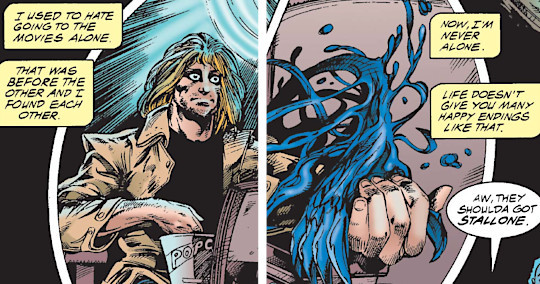
It’s by far the shippiest Venom/Eddie story to come out of the character’s heyday. It’s the only story of the era to treat Venom’s violent wild-animal instincts not as an immutable fact, but as something that can be managed. It pulls off an aesthetic like nothing else that was being done at the time.
And then there’s the way it says, Does the world around you seem sinister and foreboding? Do you lie awake at night contemplating metaphorical oceans of despair? Well shit, son – have you considered you may be suffering from a mundane neurochemical imbalance, and a round of the right meds could clear that right up for you?
It does all this without breaking the atmosphere, without a whiff that our story has been interrupted for a Very Special Message about mental health.
In the near-decade since I was first prescribed anti-depressants, I don’t think I’ve read another story that lands the message “Sometimes, it’s not you, it’s just your brain chemistry,” so well.
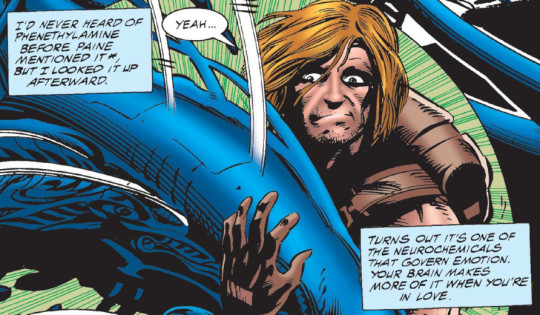
Fair warning: if you have not read The Hunger, I am about to spoil every major plot point. If you have, well, maybe I can still give you a new appreciation for a few details you might have missed.
It’s a strange book, whatever else you take from it. It’s almost the only thing either author or artist contributed to the Venom canon, and it’s so different stylistically and tonally from the 90′s Venom norm that it feels like a tale from some noir-elseworlds setting instead of 616 canon. When you take risks that big with a property, you leave yourself precious little landing space between 'unmitigated triumph’ and ‘abject failure’: if this book hadn’t absolutely nailed it, I’d be dismissing it as edgy, OOC dreck. Fortunately, if The Hunger is nothing else, it is a story that $&#@ing commits – to basically everything it does.
Now, I'm not going to tell you Venom: The Hunger is a story about overcoming depression, because I don't know whether author Len Kaminski even thought about it that way while working on it. There's always space for other readings, and this one take is not gospel. That said: holy shit is this thing unsubtle with its metaphors. And with that in mind, let’s start by talking a little about Kaminski’s take on Eddie himself.
As I may have mentioned before, I like to divide 90′s Eddie into two broad personas: the Meathead, and the Hobo.
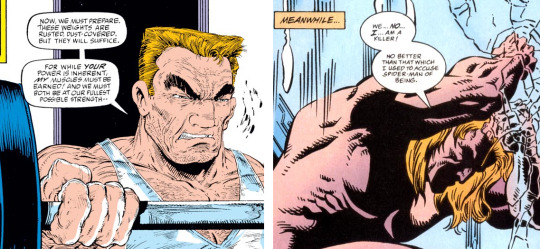
Kaminski’s Eddie nominally belongs in the angsty, long-haired Hobo incarnation, but that’s a bit of a simplification: this version certainly has plenty of angst and plenty of hair to his name – but nowhere, not even at his lowest ebb, does he doubt that he and his Other are meant for each other, which is usually Hobo!Eddie’s primary existential quandary.
He’s also taken up narrating his own life like a hardboiled PI.
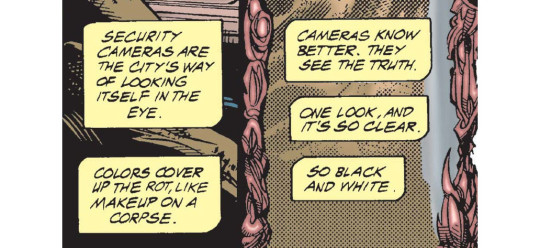
So that’s... novel.
The only other time Eddie’s sounded like this is, er, in that one other Venom one-shot Kaminski penned (Seed of Darkness, a prequel that sadly isn’t in The Hunger’s league), so I think we can safely file it under authorial ticks.
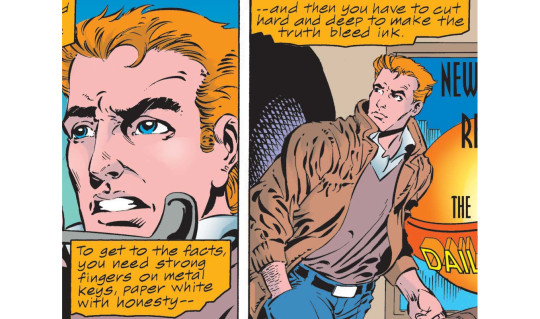
Then again, Hobo!Eddie’s always been one melodramatic SOB, so maybe this is just how he’d sound after learning to channel his angst into his poetry. You can’t argue it fits the aesthetic, anyway.
We’d also be remiss not to mention Ed Halsted’s art, which I can only describe as gothic-meets-noir-meets-H.R.-Giger. Never before or since has the alien symbiote looked this alien: twisted with Xenompoph-like ridges and veins.
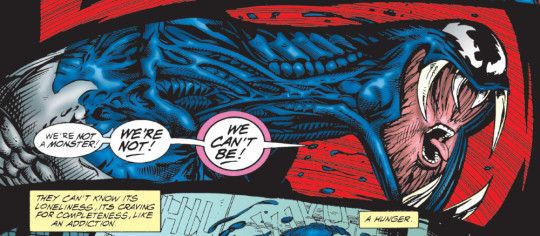
But Halsted doesn’t treat Venom to all that extra detail in every panel. Instead, the distortion tends to appear when the symbiote is separated from Eddie or out of control – and I doubt you need me to walk you through the symbolic importance of that creative decision. More importantly, Halsted’s art provides exactly the class of visuals that Kaminski’s story needs.
Did I mention this is a horror story? You might be surprised how few Venom stories really fit that genre, but if all those adjectives about Halsted’s style above didn’t clue you in, this is one of them.
Anyway, with that much context covered, let’s get into the main narrative of this thing.
As our first issue opens, Eddie’s world has become a dark and foreboding place. He’s not sleeping, though he mostly brushes this off. (Fun fact: trouble sleeping is one of those under-appreciated symptoms of depression. Additional fun fact: the first doctor ever to suggest I might be suffering from depression was actually a sleep specialist. You can guess how that appointment was going.)
Just to set our scene, here’s all of page 1.
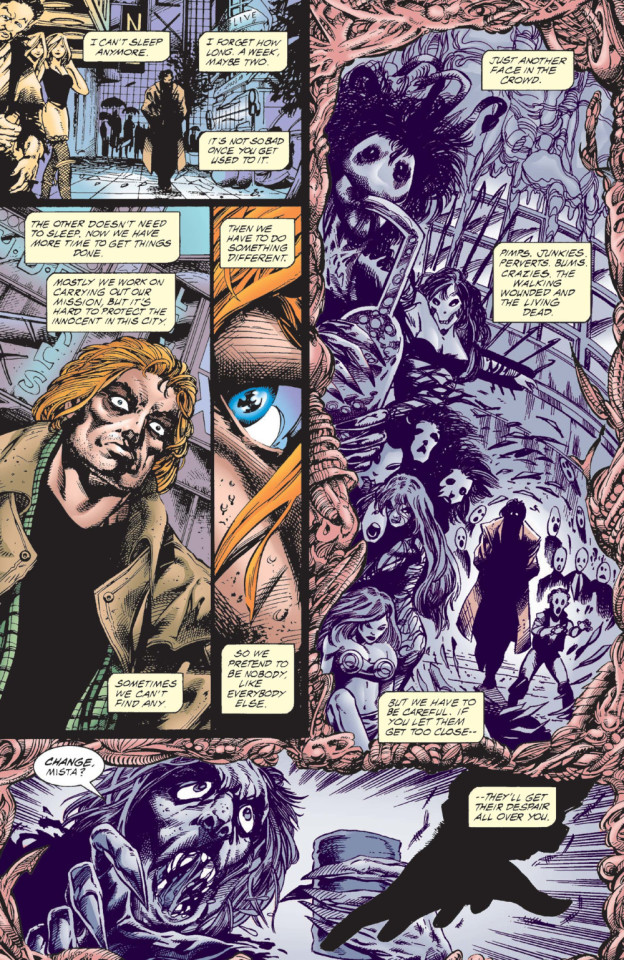
Eddie’s narration has plenty of (ha) venom for his surroundings, but the visuals are here to back him up: panels from Eddie’s POV are edged in twisted, fleshy borders and drained of colour, the people rendered as creepy, goblin-like creatures. A couple of later scenes go even further to contrast Eddie-vision with what everyone else is seeing:
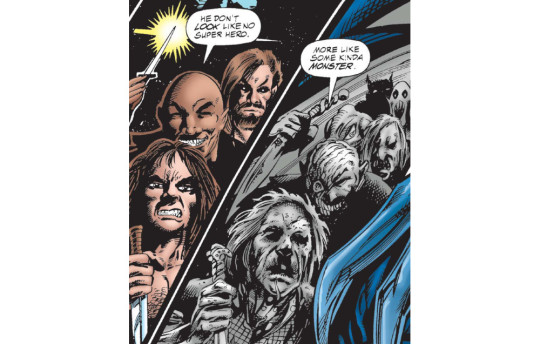
As depictions of depression go this is a little on the nose, but then, you don’t read a comic about a brain-eating alien parasite looking for subtlety, do you?
Eddie doesn’t see himself as depressed, of course. As far as he’s concerned, he’s seeing the world’s true face: it’s everyone else who’s deluding themselves. He’s still got his symbiote, so he’s happy. He’s yet to hit that all-important breaking point where something he can’t brush off goes irrevocably wrong.
But he’s also starting to experience these weird... cravings.
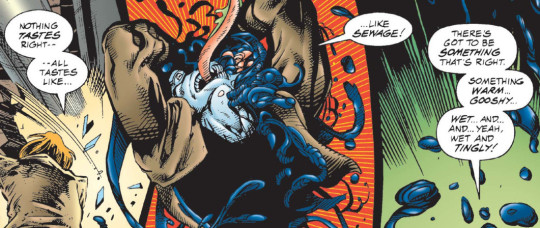
He just can’t put a name to exactly what he’s craving until a routine bar fight with a couple of thugs takes a turn for the horrific.
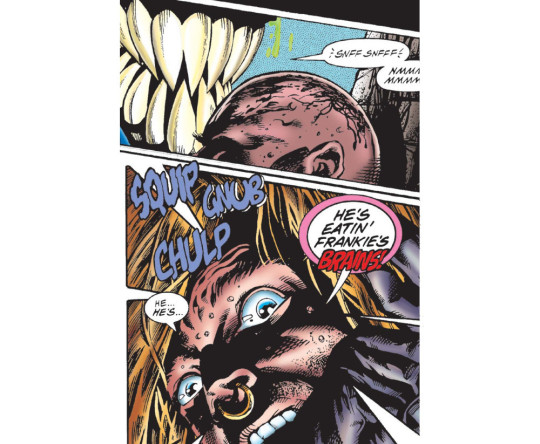
(I include this panel partly to point out even in The Hunger, the goriest of all 90′s Venom titles, you’re still not going to see brains getting eaten in any graphic detail. We don’t need to to get the horror of the moment across. The 90′s were a more innocent time.)
Eddie himself is horrified when he comes back to himself and realises what he’s done.
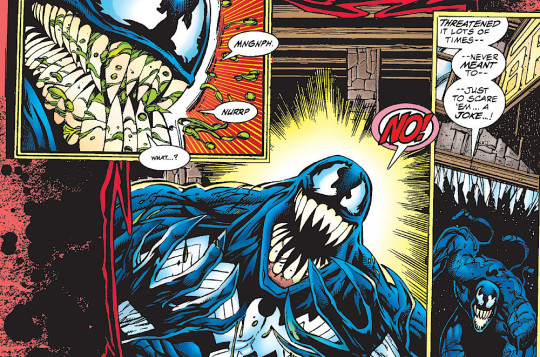
Or rather, what his symbiote’s just made him do.
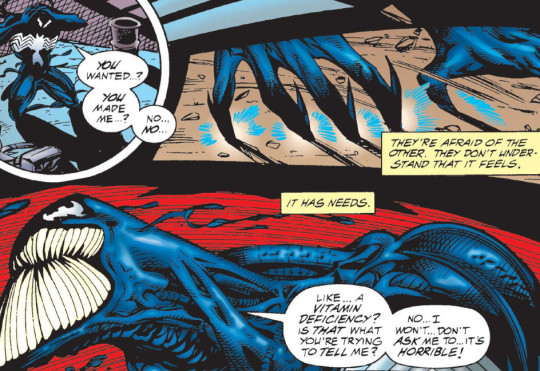
Kaminski doesn’t keep us in suspense about why, though. Eddie may have just done something horrific, but there’s a reason, and it’s as mundane as a vitamin deficiency. He’s bonded to an alien creature, after all, and his symbiote is craving a nutrient which just happens to be found in human brains. And if Eddie can’t or won’t help it meet that need, it’ll do so alone.
Now, giving us that explanation so quickly is an interesting creative decision: this is a horror story, and horror lives in what we don’t know. Wouldn’t it be all the more horrifying had the symbiote been unable to explain what’s going on, leaving Eddie without the first real clue as to where this monstrous new hunger had come from?
The Hunger doesn’t take that route though, and I love it. Eddie isn’t a monster, this isn’t his fault: he has a fucking condition, and wallowing in his own moral failings is going to get him nowhere. You might as well try to cure scurvy or rickets with positive thinking. Just like depression can make you feel like an utter failure at the most basic parts of being human, and all the affirmations in the world won’t fix it when it’s fundamentally your brain chemistry that’s the problem. Or like addicts aren’t weak-willed for struggling not to relapse, they’re dealing with genuine chemical dependency – or even like how someone who’s trans isn’t at fault for being unable to reconcile themselves to the bodies and the hormones they were born with by pure force of trying. Free will is more than an illusion, but we’re all messy, biological organisms underneath, and your own brain and biochemistry can and will fuck you over in a hundred wildly different ways for as many wildly different reasons and it’s not your fault.
We aren’t monsters. But if we do, sometimes, find ourselves identifying with the monster, there might be a reason for that.
(Ahem)
I’m just saying, that’s fucking powerful, and we need more stories that say it.
Anyway, in case you missed it during that tangent, issue #1 closes with the symbiote having torn Eddie’s heart in two itself free to go hunting brains without him.
I’m trying not to get too sidetracked at this point talking about Kaminski’s take on the symbiote itself. Suffice to say there are broadly two schools of thought on how it ought to function while separated from its host: the traditional ambulatory-slime-puddle version, and the more recently popular alternative where anything-you-can-do-with-a-host-you-can-also-do-without-one. I’m not much of a fan of the latter, personally: if your symbiote doesn’t actually need a host, I feel you’ve sort of missed the point. (The movie takes the route of saying symbiotes can’t even process Earth’s atmosphere without a host, which is a great new idea that appears nowhere in the comics, and I love it. Hosts or GTFO, baby!)
Kaminski has his own take, and I can only wish it had caught on. Without Eddie, the symbiote becomes an ever-shifting insectoid-tentacle-snake-monstrosity, driven by an animalistic hunger. It’s many things, but it’s never humanoid.
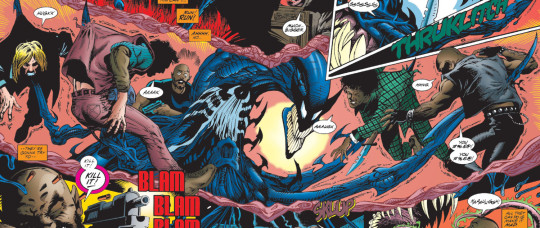
If you absolutely must have your symbiote operating minus a host, I feel this is the way to do it: semi-feral, shapeless and completely alien (uncontrollable violence and cravings for brains to be added to taste).
Issue #2 comes to us primarily through the perspective of the mild-mannered Dr. Thaddeus Paine of the Innsmouth Hills Sanitarium (yes, really).
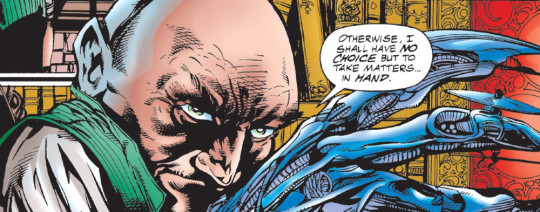
Yeah, he’s not fooling anyone. Meet our official villain! He joins our story after Eddie is picked up by the police and handed off to the nearest available institution, on account of how completely sane and rational he’s been acting.
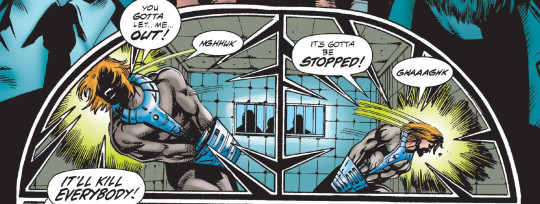
Naturally, Dr. Paine soon has copious notes on Eddie’s ‘crazy’ story about his psychic link to a brain-eating alien monster. Fortunately for Eddie, Paine also runs some tests and makes an interesting discovery.
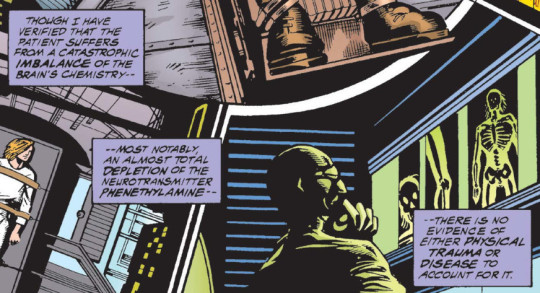
Congratulations, Venom: the ‘vitamin’ you were missing officially has a name!
Finding the right meds isn’t always this easy. I got lucky – the first ones my psych put me on worked pretty well – but I have plenty of friends who weren't so lucky. In fact, the treatment for Eddie's problems is so straightforward it arguably has more in common with, say, endocrine disorders like thyroid conditions or Addison’s disease, which differ from clinical depression but present many similar symptoms (but can sadly be just as much of a bitch to get correctly diagnosed – please do read author Maggie Stiefvater’s account of the latter when you get the chance, because forget Venom, that is a horror story).
‘True’ depression remains much less well understood by medicine, either in its causes or how to effectively treat it. But simply having a name for what was wrong with me made so much difference, and that’s an experience I imagine anyone who’s dealt with any long undiagnosed medical condition could relate to. It put my life in context in a way nothing else had in years.
(I can’t speak to the accuracy of the way phenethylamine is portrayed in this comic – a quick google suggests there may be some real debate that phenethylamine deficiencies have been overlooked as a contributor to clinical depression, but having no medical background, that one’s well beyond me. Either way, scientific accuracy really doesn’t matter in this context – it’s how it works in-universe for story purposes that we should pay attention to.)
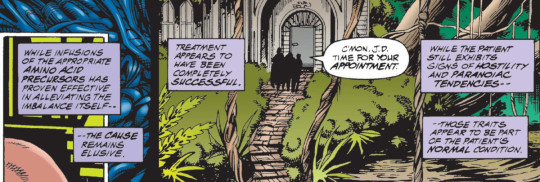
Since this issue is mostly from Paine’s POV, we don’t get Eddie’s reaction to having a healthy amount of phenethylamine sloshing around in his brain again, just the assurance that treatment appears to be ‘completely successful’.
He’s still a paranoid, hostile bastard though. Meds can turn your life around, but they won’t make you not you.
But even if Eddie’s feeling better, he’s still psychically linked to someone who isn’t. Symbiote-vision still comes through drained of colour and edged in viscera.
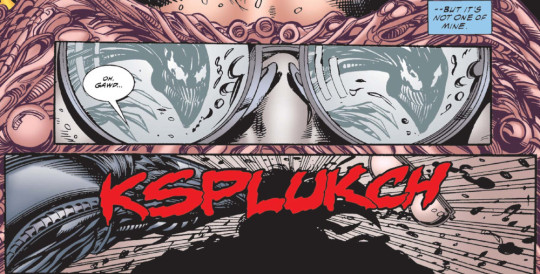
That’s the thing about meds: they won’t solve all your problems overnight. If you’ve been depressed for a while, there are good odds you have problems stacking up. But working meds can be a godsend when it comes to getting you into a space where you can deal with your problems again, whether said problems are doing-your-laundry or all the way into not-giving-up-completely-and-just-accepting-you’ll-die-alone-on-the-street.
For Eddie, ‘dealing with his problems’ begins with stealing a keycard and busting out of the asylum.
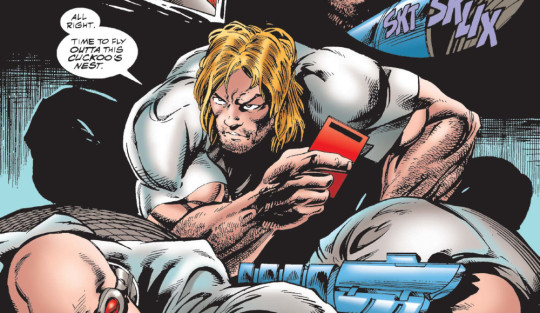
Of course, that’s the easy part. How do you solve a problem like a feral symbiote? Like any good 90′s comic book protagonist, Eddie tackles it by putting on his big-boy camouflage pants and kitting himself out with weapons and pouches while quoting “If you live something, set it free. If it doesn’t come back, hunt it down.”
We can add this to the list of things I love about this comic. Even if The Hunger is a weirdly-stylistic tract about depression at heart, it’s also still a goddamn 90′s Venom comic, and not ashamed to be.
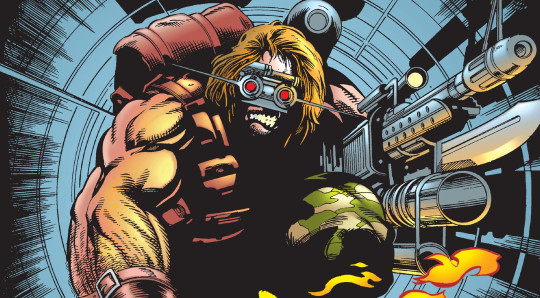
We’re into issue #3 now, and back to hearing the story from Eddie’s POV.
Eddie is very much aware that his symbiote has murdered innocent people while they’ve been separated. Even if this is the result of extreme circumstances, there’s a good case to be made that the symbiote is too dangerous to be allowed to live. Plenty of heroes would treat it like a rabid dog at this point.
But Eddie isn’t a hero, he’s a mess of a character and an anti-hero at best, so we don’t have to hold him to the same standard. He’s well aware his symbiote may be too far gone to save, that he may have to put it down – but that’s only his backup plan. He wants to help it. He wants it back. He’s down in that sewer with screamers and a flamethrower because he knows all his symbiote’s weaknesses, but he’s also carrying a large jar of black-market synthesised phenethylamine, because if he can just get close enough...
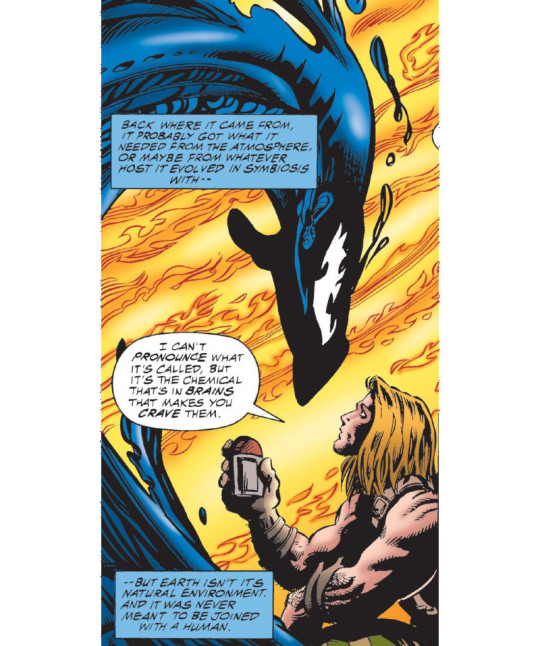
Depression can’t make you a literal monster, but it can make you an asshole. Miserable to be around, lacking even the energy to care who else you’re hurting. The depression doesn’t excuse that, but it makes everything harder, and it’s that much easier to sink back into your spiral when everyone around you has given up. It can make you think everyone around has given up even if that isn’t true.
So to have Eddie here say, in effect, I don’t care how many people you’ve eaten, I know it wasn’t your fault. I still love you. You’re still worth fighting for – god, does that get me right in the id.
There’s still a whole issue left at this point – we’ve still got to deal with our real villain, Dr. Paine, who we’ve just learned is into eating brains himself and torturing his patients recreationally, and who wants to capture the symbiote for his own purposes. There’s the scene where Eddie and his symbiote finally bond again, and Venom beats up all Paine’s goons while singing David Bowie because like I said, this is still a 90′s superhero comic and this is what Venom does.
But for our purposes, I'm going to skip to the penultimate page of the story, because the way it mirrors our opening page is really lovely.
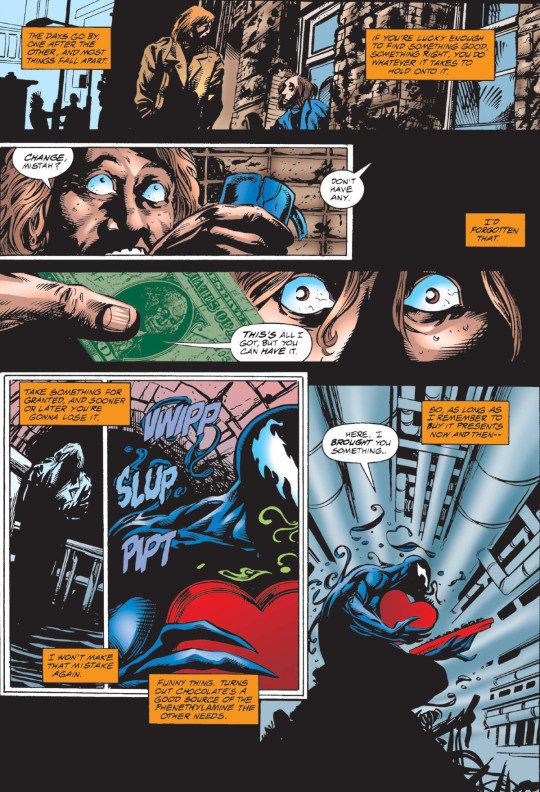
Remember that shot of Eddie dealing with a beggar back at the beginning of the story, thinking about how these people would 'get their despair all over you'? Here he is again, cheerfully forking over the last dollar in his pocket to the next man to ask him for change. For all the gothic atmosphere and gore, it’s moments like this that make The Hunger easily one of the most positive, uplifting Venom stories ever written. Funny, that. (I could probably write a whole other essay on sympathy for the homeless as a recurring motif in Venom stories, but that... well, whole other essay and all that.)
What’s Eddie learned from this experience? Don’t take your symbiote for granted. Is ‘symbiote’ a metaphor for mental health here, is paying attention to its needs an allegory for paying attention to your own? I still don’t know how literally Kaminski meant us to take this, but it’s a lovely note to end on no matter how you parse it.
At the end of the day, The Hunger isn’t flawless. The conflict with Paine ends on a thematic but slightly unsatisfying note. Eddie makes much of his symbiote's loneliness and desire for union, but when the two of them are finally reunited, the only reaction comes from Eddie's side. In fact, the symbiote seems to have no response to being able to return to Eddie at all, and that’s an omission that bugs me.
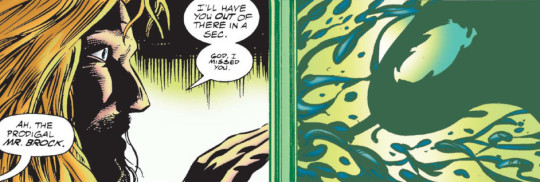
But Kaminski is more interested than any other writer of the era in the truly alien nature of the symbiote, in its relationship with Eddie from Eddie’s side, and though plenty of others talk about the symbiote's love/hate relationship with Spider-man, no-one else had the guts to portray their relationship this much like a romance.
And Venom: The Hunger is no less interesting in the context of Len Kaminski’s other work. You don't have to look far into his Marvel and DC credits to pick up that the guy has a real thing for monsters. (“All of my favourite characters are outlaws, misfits, anti-heroes,” he says, in one of the very few interviews I could find with him, “I wouldn't know what to do with Superman.”) He's written for vampires, werewolves, victims of mad science, and all of three at once, littering his work with biochemistry-themed technobabble, melodramatic monologues, gratuitous pop-culture references, and protagonists who must learn to embrace their inner demons. So The Hunger represents more than a few of his favourite running themes.
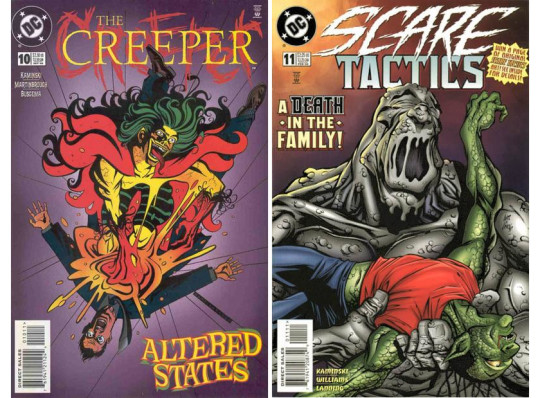
For our context, his more notable other work includes Children of the Beast, in which a werewolf must make peace between his human and animalistic sides, and The Creeper, in which a journalist must make peace with the crazy super-powered alter-ego sharing his body. In fact, The Creeper and The Hunger share so much DNA (including an evil doctor posing as a respected psychiatrist who uses hypnosis on our hero while he's trapped in a mental institution) that it’s quite the achievement that they still feel like such very distinct entities beyond that point.
The human alter-egos of both werewolf and Creeper even use prescription meds while wrestling with their respective dark sides. The difference, in both cases, is that these are stories where meds play their traditional fictional role – and that's a role that could be as easily filled by illegal drugs or alcohol without making any substantive difference. You see, if a protagonist is using them, it's a sign of unwillingness to tackle their 'real' problems. Even among work by the same author in the same genre, The Hunger represents an outlier. And that's just a little disappointing – at least to me.
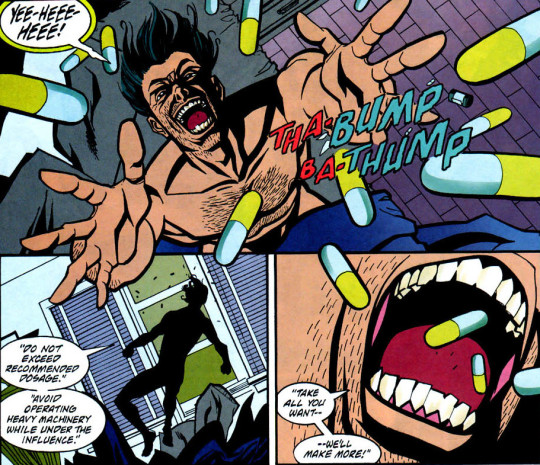
In real life, of course, prescription meds are no magical cure-all elixir. Depression meds that work for one person may not work for another, or may not keep working in the longer term. Everyone has heard stories about quack doctors who prescribe them to the wrong patients for the wrong reasons, about lives ruined by addictions to prescription painkillers, or the supposedly-damning statistics about how poorly SSRI's perform in rigorous clinical trials. The proper way to treat depression is obviously with lifestyle and therapy. People will still airily dismiss medications that we all know previous generations got along just fine without, or suggest that figures like Van Gogh would never have created great art if they hadn't been mad enough to slice off an ear. I mean, the fact you think you need those bogus mediations is probably the best possible sign of just how broken you are, right? Who do you think you’re kidding?
Our popular fiction loves stories about manly men who bury their trauma under a gruff, anti-social exterior and come back swinging at the world that broke them, bravely refusing even painkillers that might dull their manly reflexes. Other genres make space for broken people confronting their demons in grand moments of catharsis, finally breaking down into tears when someone gets through to make them face their problems. "I could barely make it out of bed in the mornings until I found a doctor who started me on this new prescription" is not only wildly counter to the accepted social narrative, it's a hard thing to know how to dramatise.
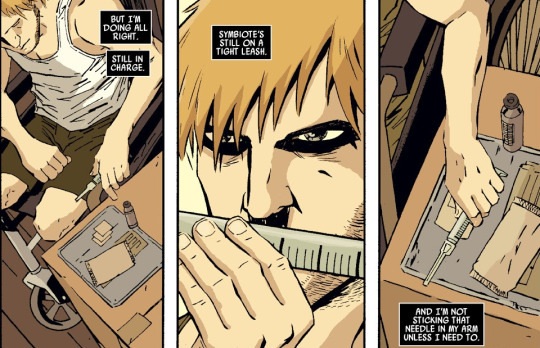
Even other Venom comics have been guilty of this.
Believe me, I recognise all of this, and just how much progress we've made in the last few decades. But I haven't the slightest doubt that for so many vulnerable people, the stigma against prescription medications does infinitely more harm than those same meds could ever do. And just having the right to externalise my problems into it's not you, it's your brain chemistry, may have helped me more than the meds themselves.
(And again, no, being prescribed SSRI's didn't fix me overnight, but I honestly don't know if all the talk therapy and tearful conversations with family members in the world could've got me as far as I've come without them.)
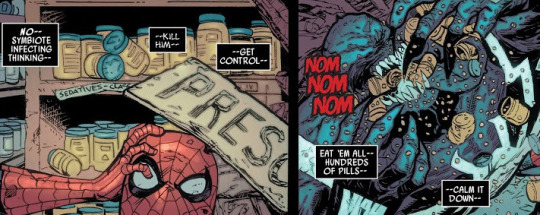
I love Venom: The Hunger. It's no-one's idea of high art, but it doesn’t need to be. There is a whole other post’s worth of things I love about it that I’ve already cut out this one as pointless tangents, and that may actually be it’s biggest drawback as a go-to example: I fully recognise that I would not be making this post if The Hunger hadn't also also grabbed me as a great bit of Venom canon, being the massive fan and shipper that I am. Other people who are just as desperate as me for more stories with the same core theme, but not into weird 90's comics about needy goo aliens, probably won't get nearly as much out of it as I have.
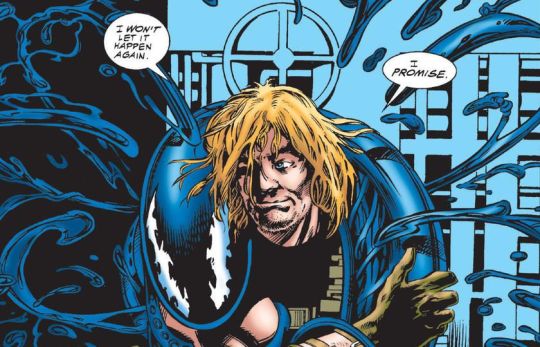
But if it sounds anything like your jam, maybe you'll enjoy it as much as I did.
If nothing else, it proves that you can make a viscerally satisfying story out of a message that shockingly unconventional. And you may even have people still discovering it and falling in love with it 25 years after the fact.
98 notes
·
View notes
Text
Schitt’s Creek and the Transformative Power of Love
I first watched the pilot for Schitt’s Creek in the early part of 2019 and found it...eccentric. Not really funny, the characters weren’t speaking to me (except for Stevie (Emily Hampshire), whom I felt a kinship with), and the story seemed odd. I decided this show just wasn’t for me, and I had given it my best shot. Many months later, one of my best friends was posting about it frequently. Since we have the same taste, I thought maybe it was just the pilot. Maybe I should give it another shot. Maybe this time I’ll actually like it. So I started it from the pilot again, and I kept watching even if I wasn’t thoroughly entertained. I soon grew to love the two black sheep and having characters you understand always makes things easier.
What I didn’t realize when I started the show was that the characters were each more than they seem, they weren’t meant to be shallow jokes of themselves and their personas. The way they acted was often a façade hiding their insecurities of not being good enough in a variety of ways. The only other show that I’ve seen with a somewhat similar premise is Arrested Development, but there the characters are supposed to be absolutely ignorant, privileged assholes with no redeeming qualities.
I didn’t realize each season is better than the last, an astounding and rare feat in television. The quality of each season improves as the show quickly finds its footing by discarding early storylines that didn’t really work and letting the characters slowly becoming more grounded and open. This family that was once so distant that the parents didn’t even know their daughter’s middle name eventually develop genuine relationships for the first time with each other and other people.
Schitt’s Creek, co-created by father and son, Eugene (American Pie, Best in Show) and Dan Levy, wanted us to ultimately empathize with these characters, even if the remnants of their wealth can make them profoundly delusional and hilarious a lot of the time. Before writing the show, they created timelines going back to their characters’ elementary school years, detailing everything from where they worked to what they wore.
The fashion on the show is distinct and the best dressed I’ve seen in any show (and most films). Dan is huge into fashion and personally selects a lot of pieces worn in the show (some of David’s clothes are even from his own wardrobe). Instead of constantly telling the audience that this family used to be rich, we are reminded of it through Moira’s wall of wigs and couture black and white ensembles, David’s patterned black sweaters and low crotch pants, Alexis’s bohemian dresses and headbands, and Johnny’s array of business suits. When they enter any room in town, they are clearly fish out of water.
Schitt’s Creek centers on the Roses, a once-disgustingly wealthy family who lose their fortune and are forced to move to the only asset they have left: a small town named Schitt’s Creek that Johnny Rose (Eugene Levy) bought as a joke for his son, David (Dan Levy). So dilapidated is Schitt's Creek and so destitute are the Roses, they don't even have a house of their own; instead they are forced to live in a motel with two connecting rooms, forgoing all the luxury they had become accustomed to and, more terrifyingly, are now physically closer than ever.
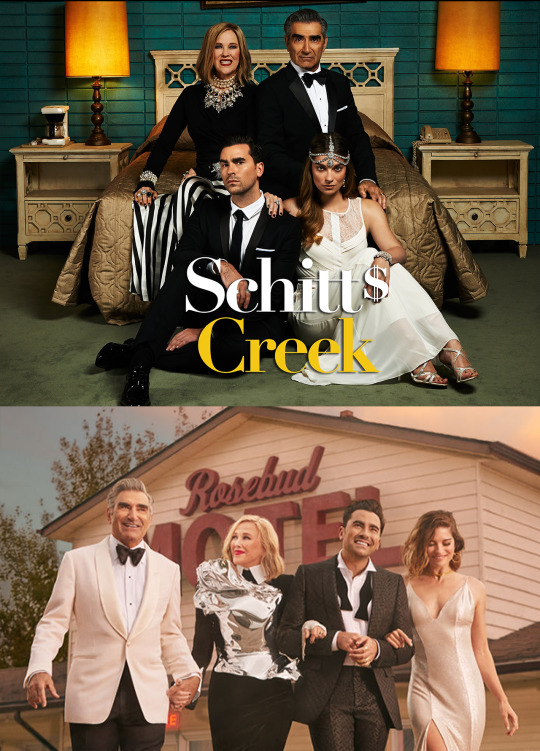
While at first the family is horrified at the prospect of living in such a small town with townies, they eventually embrace the weirdness of the town, and it makes them grow in unexpected ways. Johnny was once the owner of the second-largest video rental store in the country and retains his businessman-like self through and through, but he also began the show more uppity. While he is often the most reasonable of the Roses, he often sees himself as above others in town and gets into awkward situations because of it. Over the course of the show he ends up developing a friendship with the town mayor to whom he initially had yelled “get the fuck out!” While he’s always devoted to his wife, he wasn’t so keen on his children, but being forced to live together makes him take a larger interest in their lives and become a better father.
Alexis (Annie Murphy) is the quintessential “dumb blonde” socialite who’s had a Schitt-ton of relationships with powerful men, making stories of her past highly entertaining, often illegal, and frequently frightening. She clearly grew up way too fast, never having had proper adult supervision. She’s reliant on men, and all she can think about in season one is trying to date cute guys. In the following seasons, she realizes it’s time to start growing up and gets her high school and Associate’s Degree to start her own PR business. She becomes a more enlightened version of herself, still deeply kind but also willing to put the happiness of others above her own. The Alexis who previously couldn’t see beyond her own nose becomes independent and more selfless.
David’s had hundreds of flings with people of all genders, but they seem to be replete with abuse, manipulation, and a lack of care for his being. This is unsurprising when we see how he hides his insecurity behind sarcasm and sometimes downplays things he doesn’t like to fit in. He fears showing kindness to anyone because others haven’t always been so kind to him. Early on, he has a panic attack and comes to the realization that he’s “really lonely here,” but he’s been lonely for a lot longer than that. What he doesn’t expect is to make his first best friend or find his soon-to-be husband in this backwater town. In the process, he learns to shed some of his armor.
Moira (Catherine O’Hara) was once on a soap opera, Sunrise Bay, and retains the melodrama in her day-to-day life and demeanor. She is constantly trying to become what she believes is a star: someone who acts in film, someone who everyone mourns when they die, someone who people will just pay one sliver of attention to. She’s desperately trying to cling to the spotlight, but in “Life is a Cabaret,” she finds what I believe will be her place come this final season. Rather than trying to constantly soak up attention, she gives Stevie the starring role in the town’s production of Cabaret (which Moira comes to direct) because getting that role was a “gift that once jolted [her] out of [her] little podunk routine.” From the wings of the stage, as Stevie slowly builds into “Maybe This Time” with such breathtaking passion and joy after starting off unsure and quiet, Moira is shocked at what she was able to bring out of Stevie. She’s finally realizing that her place isn’t center stage but in bringing out the best in others and helping them find their place in the world.
Stevie Budd begins as the desk clerk of the Schitt’s Creek motel until her great-aunt passes away, and she inherits the motel. From there she has to decide whether she’s ready to grow up and take over the family business, and she’s terrified. Johnny soon teams up with her in the business, renovating the motel and renaming it after both of them, so she sees the Roses aren’t going to abandon her. She is part of the Rose’s found family. Her and David are similar in their bluntness and sarcasm, but Stevie is insecure about never making it out of the town, never being more than a motel desk clerk, never having a long-term romantic relationship. She worries while everyone moves on with their lives, she’s “watching it all happen from behind the desk.”
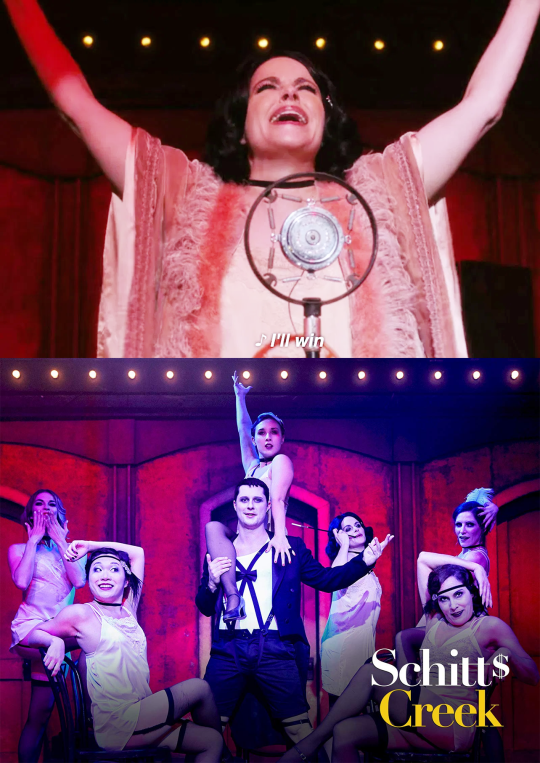
Dan describes creating Schitt’s Creek as “writing a world that examines the transformational effects of love when the threat of hate and intolerance has been removed from the equation.” While homophobia is often front and center in any media depicting LGBT characters, Schitt’s Creek doesn’t give it as much thought. Where small towns are usually seen as ripe for homophobia, transphobia, and other discrimination, Schitt’s Creek doesn’t fall prey to this trope. Instead, this small town is bursting with love.
Dan purposely made David pansexual (it’s also the only show I’ve seen use the word) to challenge the viewer’s biases and push the boundaries of what it means to be masculine and feminine. David’s parents and others in the town never discuss it as anything strange or bad, it’s something he simply is and as common as the sky being blue. When David tells Stevie about his sexuality (“I like the wine, not the label”), she’s a bit surprised at first because she thought he was gay, but ultimately she doesn’t care.
This doesn’t mean the show never discusses what homophobia can be like, but it comes at it from a different lens.
For example, in “Meet the Parents,” David decides to throw a surprise birthday party for his boyfriend, Patrick Brewer (Noah Reid). What David doesn’t realize is Patrick hasn’t come out to his parents yet, they think David is solely his business partner. He tells David, “I know my parents are good people, I just...can’t shake this fear that there is a small chance that this could change everything.” David himself is prepared for homophobia from Patrick’s parents, but when they tell him they don’t care about that, just that he was hiding such an important part of himself from them, David who’s been trying to stay strong through it all wipes a tear.
“When I found myself in a position to tell stories on a global scale, I seized the opportunity to make a television show that might, in its own way, offer some support, encouragement and love to those who might not have it in their homes or in their schools or in their day to day lives. It’s a place where acceptance incubates joy and creates a clarity that allows people to see themselves and each other more deeply. It’s fiction, yes. But I’ve always been told to lead by example and this felt like a good place to start.”
— Dan Levy
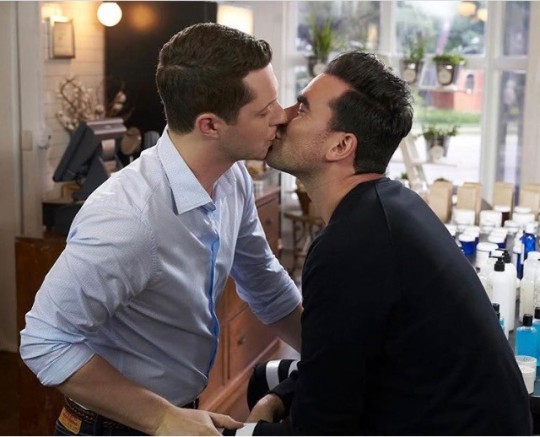
I would be remiss to not touch on the comedic style of the show. This is a comedy that relies heavily on the physicality of its actors. Their facial expressions, accents and tonality, their limp wrists, each create uniquely funny characters with mannerisms unlike any I’ve seen. The cast brought nuance to the characters, when they could have easily fallen into vapid stereotypes.
As season 6 premiered on January 7, Schitt’s Creek is not done yet, and I can’t wait to see how its final season concludes. The characters are all happier now that they are achieving dreams they may not have known they had, they have fulfilling relationships with family and friends, and they all have grown into better people. Schitt’s Creek truly was their saving grace.
*
I’m in a TV group where we wrote essays on our favorite shows of the 2010s, so here is mine on Schitt’s Creek.
619 notes
·
View notes
Text
2020 Anime Retrospective
With the end of the year here, and all the anime that came with it now behind us, I feel like looking back and reminiscing on it. So, following the style of ANN's own yearly retrospectives, may I present my 2020 anime in review! Enjoy.

Best of the year: Keep Your Hands Off Eizouken
This is actually not the first time Yuasa and his crew of, let's be honest, visionaries have rolled something special out right at the beginning of the year in some weird power move against everything else that has to follow it. They did it back in 2018 with Devilman Crybaby, and then they hit us this year with Keep Your Hands Off Eizouken. You ever have one of those shows where you're just constantly in awe of everything it does? Where you never found yourself chasing merch or hunting after content based off it online, but you consistently find yourself thinking about it? Yeah, that's what Eizouken did to my brain after I watched it. It was such an earnest love letter to anime and anime production, to animation in general, that I couldn't help but get sucked into its imagination and enthusiasm. The way it was able to so perfectly illustrate that pure, boundless, childlike joy that one can derive from the simple act of creating, I'd be lying if I didn't say that it had a powerful effect on my own desire to continue creating. (Corny as that sounds, it's true.) The sheer amount of love it contains, and the equal amount it puts out into the world make it so I know I am going to be thinking about it again and again for a long long time.
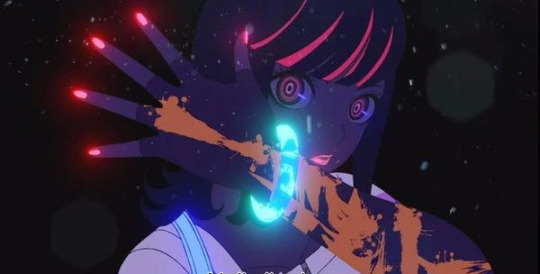
Runner-up: Akudama Drive
I don't know if it's really quite a matter of my two favorites being opposites, but there are definitely some pretty sharp stylistic and tonal differences between my two top shows this year. Akudama Drive's cocaine-fueled bender of an intro episode made it very clear what it's intentions were and what it wanted us to be prepared for. That doesn't mean I had ANY idea of where it was headed narratively, but I did know I was in for one hell of a ride. And it delivered is spades on that promise. The twists and turns, no matter how insane, illogical, or steeped in tropes they were, were all such a colorful energetic spectacle that it would be hard to hold anything against the series. Every character was such a force that I didn't really consider any of them a weak point. Yeah, some of them were more or less cardboard cut-outs of antagonistic elements, but when the cardboard cutout looks REALLY FREAKING COOL, it's hard to get too torn up over the details. It's a show that oozes style and knew EXACTLY what it wanted to do and be, and I have to respect that.

Runner-up-up: Toilet-Bound Hanako-kun
The next few entries aren't really in any sort of order, I actually found it near impossible to sort anything below my top two. Hanako-kun however does hold a bit of a special place for me though because, at least from a stylistic standpoint, it hits so many of my buttons. Just visually this show is the exact kind of thing my younger self would have latched onto immediately, even before knowing anything about the actual content. I suppose not much has really changed though. I'm absolutely in love with the animation style of Hanako-kun, and I got really lucky that there is an interesting story and delightful cast of characters underneath that visual splendor. Along with the sharp lines, intense colors, and soft characters, I'm also a sucker for contemporary supernatural mysteries. That's a fancy way of saying one of my favorite shows as a kid was The X-files, but both make the point pretty well. The world of Hanako-kun has a lot to offer, and I can only hope it gets a second season so we can continue to delve into it's beautiful and terrifying mysteries.
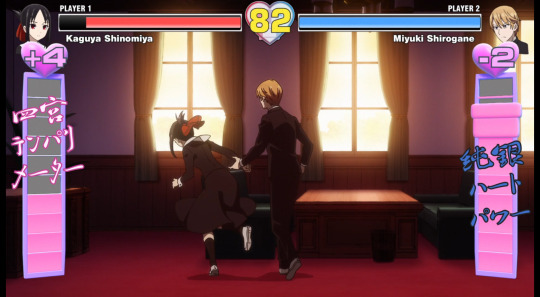
Runner-up-up: Kaguya-sama: Love is War Season 2
I know a lot of people will be talking about this one when it comes to “Best of” lists. I know a lot of people were talking about the first season when it reminded us just how funny anime can be back in 2018. Absurd high school comedies (Is that a genre?) could definitely be considered my favorite. Hell, of my top five favorite anime of all time, THREE of them fall under that category. So believe me when I say Kaguya-sama absolutely deserves the deluge of praise it receives. For what describing something as “laugh out loud” is worth, this show had me constantly needing to pause it just so I could finish laughing at whatever ludicrously funny misfortune had just befallen it's cast of lovable morons. The thing is though, Kaguya-sama understands that you can't just earn love and goodwill on laughs alone, there needs to be a beating heart at the center of all the shenanigans. And when this season had me actually cheering on and feeling sorry for Ishigami of all people, I knew that beating heart was present and accounted for. Look, the cast are all self-centered idiots, but I'll be damned if they aren't also my dear children who I delight in watching slowly grow and become slightly less self-centered idiots.
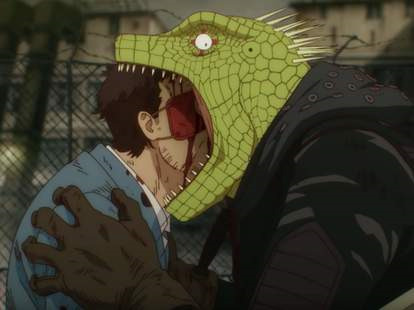
Runner-up-up: Dorohedoro
When the Dorohedoro anime was first announced, a lot of my experience was watching a group of people online scream about how they were so pumped that it was finally getting an anime. I had never heard of it before, but the excitement was very real and tangible. And I gotta say, sometimes you need to believe the hype. I've never been one to shirk a series just because it was CG animation, (Watch ID-0 dammit!) but Dorohedoro makes a strong case for why people shouldn't sleep on something based solely on it's animation. The dirty, grease-encrusted world of Hole is brought to life with plenty of flair and style that, I feel, the CG didn't hold back at all. What I had seen said was that for a long time Dorohedoro was kinda considered “unanimateable” but I think MAPPA did the iconic manga a fair amount of justice. Even if pulpy ultra-violence isn't normally your thing, I still highly recommend giving Dorohedoro a look, it might just end up being a hole worth going down.

Honorable Mention: Show By Rock!! Mashumairesh!!
I know what you're thinking, but hear me out. The first Show By Rock!! was definitely an indulgence for me. While not something I considered a high level series by any stretch: messy plotting, shallow characters, a weird isekai angle, a lackluster finale, and an even MORE lackluster second season, it still got is hooks into me with its sheer energy and fluffy charm. So despite the, as mentioned, rough second season, I was more than happy to check out the new series in the franchise. And boy was I glad I did. Mashumairesh!! takes all the heart and sweetness that worked for the first series and dials it up. It then took a hard look at a lot of what DIDN'T work in the first series, and manages to fix most of the issues. Removing the isekai angle and the whole existential threat thing, and just letting the series be a “slice-of-life but in an electric animal filled music world” did wonders for the direction and consistency. Add to that more properly fleshed out characters, and you get a series that is far stronger than it's progenitor. The next series, Show By Rock!! Stars!!, will be adding back the cast from the first series, and that could very well be a sign that it will be falling back into its old habits, but the presence of the Mahumairesh!! girls gives me hope that it might have a chance of staying the new, far better course.

Worst of the Year: Digimon Adventure:
This one really hurts to say. What hurt more was how quickly I knew what show I'd be electing for this position. One thing to clarify is that I would not nominate a series that I'd only watched one or two episodes of, that's just not fair. So the award was bound to go to something I had at least dedicated a decent amount of my time too. And in any other year this may have gone to something that was more my “least favorite” or had an ending that disappointed me. But unfortunately I have to be honest and sit here and tell you that the newest entry in the Digimon franchise was easily the worst thing I watched this year. I have been a long time Digimon fan. Ever since I was but a wee lass watching the original Digimon Adventure premiere on Fox Kids at a family reunion, I have always considered the franchise a sort of cornerstone of my anime fandom. So please understand the excitement I had felt when I found out they were doing a full on remake of that flagship series. Imagine how absolutely pumped I was when the bombastic movie-like premiere of Digimon Adventure: wowed us with everything it delivered, and all the promises of what was to come. And then imagine my disappointment, my despair as the show devolved until it showed us what it really was during the finale of the Fake Tokyo arc. I would call it a production meltdown, but considering the precedent that got set back in episode 10 during the already shaky Ultimate Evolution arc, has been so clearly informing everything up to the current episodes in the early 30s, I have to be honest with myself and admit: this is what we were going to get all along from day one. All of the heart that had made the original series so endearing, despite its own flaws, just isn't present here. What you get here is just a non-stop (and I mean non-stop) string of barely related fights with poorly-defined stakes, or sometimes no real stakes at all. It's just one ugly set piece fight after another as the children chase after vaguely implied evils. I think the most damning thing is how much more I could say about just how much this series has let me down. Like I said, this one hurts.
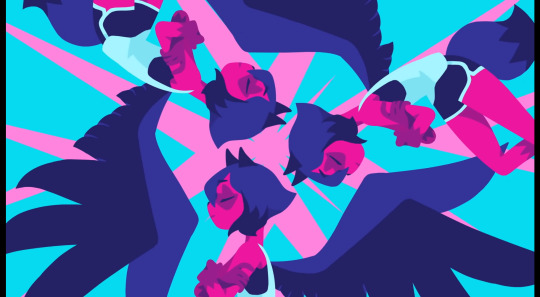
Best Theme-Song of the Year: Night Running (BNA)
My opinion of BNA as a series is complex. But my opinion of its ED, Night Running, is simple: Its a god-damned bop! I could spend this whole section talking about the artistry of the ED animation itself, its fun and creative use of color, the slight variations for certain episodes, the focus on character, or the fact that it was done by an American animation team. I could even talk about the song's importance to the series as a whole and its place in the narrative. I won't though. The fact of the matter is that even without all that, I STILL probably would've picked Night Running as my best of the year because as a song it is just that much my jam. This is the kind of shit I could listen to on repeat for hours, days, weeks, and still keep coming back to it. Don't get me wrong, Ready To is a damn powerful and catchy tune that goes hard, but at the end of the day, I'm a sucker for a soulful pop tune like Night Running. https://www.youtube.com/watch?v=WWTFfEnMCCc

Best Character: Sayaka Kanamori
This was actually probably the hardest category for me to decide on. It was stuck hard between Eizoken's Kanamori and Akudama Drive's Doctor. I know those are a powerfully different pair in basically every way, but it was specifically for their startling differences that both characters stuck out to me so much. In the end though, it was the poignant rounding out of, and emotional hooks of Kanamori's character that let her triumph over her delightfully two-dimensional opposition. Kanamori already had me from episode one. In a show that I wasn't really worried about the usual diversions of anime ingestion like picking a favorite character, Kanamori sealed herself as “Best-girl” from the word go. I have mad respect for a girl who knows what she wants, and has a clear idea of how she's going to go about getting it (See also: Doctor.) But Kanamori was more than a driving desire for success and money. Underneath her unstoppable ambition there was a very real, very relatable driving impetus. She stood apart, and yet still believably vulnerable and invested in the people she associated with. It was always a blast watching her suffer as the only thing keeping the more creative minds on track, and yet she was never reduced to a simple task master; her love and respect for her friends was always clearly visible. I could go on and on about how Kanamori is a nearly perfect character, but I hope I've said enough already without having to resort to senseless rambling.

Best Moment: Howan confesses her feeling to Himeko (Show By Rock!! Mashumairesh!!)
By the time episode six rolled around, Mashumairesh!! had already shown marked improvements over its progenitor in basically every area. Not only was the story in a better place by focusing on what had worked in the original series, (Ya know the BAND part of this show about bands) but the cast was also doing a good job of standing out from their seniors and feeling more equally rounded out. Where the original series had just kinda been the Cyan show with guest stars, I felt like I had an actual grip on all four of the main girls now. There were however the usual issues that come with a cute-girls-doing-cute-things series, chief among them the “ambiguously gay member of the group who constantly reacts with clear romantic interest towards the main protagonist but the writing will never actually do anything with those feelings” trope. Retoree had spent the better part of the first two seasons fawning over Cyan only for nothing to come of it and, despite the increased focus on all of the girls this time around, it looked like we were going to get the same old song and dance with Himeko's feelings towards Howan. But then the climax of episode six hit and, midst a really intense subplot about Himeko's abandonment complex, Howan comes out with a straight up love confession. And I kept waiting for the usual dead-ends these moments always seem to have. The “I love you! I love the girls too! I love the band!” Or a “I love being with you.” and the dreaded, “I love having you as my most precious friend.” But none of that happened. It was a full on heart-felt, “I love you, Himeko. I want to stay with you forever!” I'm just not used to getting that sort of straightforwardness from my silly little band shows, so I was shocked, but also completely overjoyed. And frankly the series just kept getting better from there. The evolution of their relationship built off that moment, no dreaded resetting of the status quo. I daresay it was on the power of this moment alone that I wanted to include this series in my top five at all. If there was anything I would want other anime to take from Mashumairesh!! it's that it's okay to introduce radical changes to character relationships partway through a season, and it's okay to let characters unequivocally state their feelings for each other. People will respond positively to that earnestness, I promise.
#anime#keep your hands off eizouken!#sayaka kanamori#akudama drive#toilet-bound hanako-kun#kaguya sama wo kataritai#kaguya-sama love is war#dorohedoro#show by rock#show by rock mashumairesh!!#howan#mashima himeko#digimon#digimon adventure:#BNA#Brand New Animal#Night Running
25 notes
·
View notes
Text
February 7, 2021: Emma. (Review)
Y’know, I remember nothing of this book. Really, I genuinely remember nothing from it, but the movie?

I really liked the movie! Not that it’s perfect, but I genuinely thought that this movie was excellent. Various reasons for that, primary of which would be that this movie looks absolutely fantastic. And again, I’ll get into that in the breakd won but...I mean, LOOK at this movie!
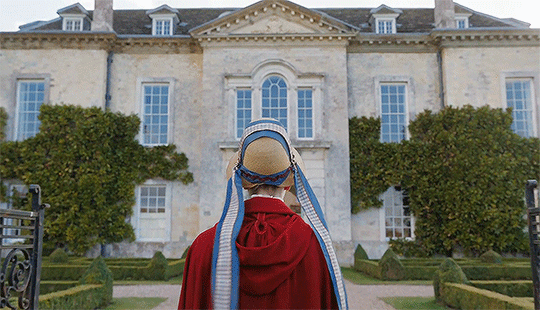
LOOK! (in Gordon Ramsay)
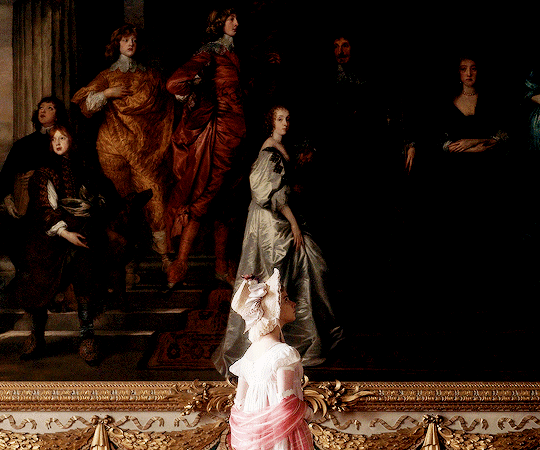
LOOK!!!
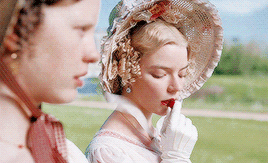
WHAT THE FUCK

DONKEY

On to the Review, yeah?
Review

Cast and Acting: 9/10
First things first: my favorite character in this film is BY FAR George Knightley, and Johnny Flynn is a GREAT actor in the role. Seriously, he manages to hint at his feelings and affections for Emma, far before even HE truly knows them. It’s just a great performance. But hey...I gotta talk about Anya Taylor-Joy, who...WOW. She’s amazing. Might not have been my favorite character in the first haf (which, to be fair, is the point), but she definitely sold that character transformation by the end! Just a legitimately amazing performance, and the chemistry between Taylor-Joy and Flynn is...MMMMMM, chef’s kiss! Oh, also, full credit to Mia Goth, whose Harriet is a great understated performance, and also deserves a chef’s kiss. Seriously, she’s also absolutely fantastic.
And everybody else...is good. They’re great, even, but they aren’t my favorites. Even then, they aren’t exactly always as fitting tonally with the lead performances. It’s not really distracting at all (oh, and Bill Nighy is a goddamn treasure, by the way), but some clashing performances are enough for me to take away a single point. Yeah, that’s it, because the ensemble is still strong, and it’s still fantastic in general.
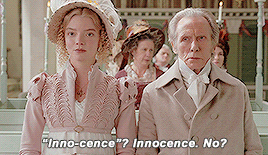
Plot and Writing: 8/10
Just like the last entry, kind of hard to judge this one without judging the original, but...I don’t remember the original. So on it’s own efforts, it’s great! Credit to Jane Austen for the story, of course, and to Eleanor Catton for the screenplay. So, why not perfect? Because, uh...this movie’s complicated. It’s REALLY convoluted, and the likelihood is high that I’ll forget specific details of it...now, I[ve forgotten some of them now. THIS is why I don’t remember the book! And, no there isn’t much to be done about that, but not much seems to be done about it So, yeah, taking off a couple for that.

Directing and Cinematography: 10/10
Um...it’s amazing? It’s also Autumn de Wilde’s first movie EVER, and she had a background in music album cover photography before this and it looks...amazing? Like, what in the shit? Cinematographer Christopher Blauweit also gets that no slouch award, because he’s goddamn great at his job. And the 10′s don’t stop there, folks!

Production and Art Design: 10/10
Because NO EXPLANATION IS NEEDED HERE. THIS MOVIE IS GORGEOUS. Just pastel cottagecore beauty splattered all over the goddamn screen. gain, I’m not goddamn explaining this shit, it’s amazing.

Music and Editing: 8/10
OK, so here’s the deal with this: it’s fantastic, it really is and all the credit in the world to Isobel Waller-Bridge and David Schweitzer for that. But...it doesn’t perfectly pass the playlist test for me. I would look this up on Apple Music (yeah, I use an iPhone, I’m sorry), but I probably wouldn’t end up downloading it at the end of the day, to be completely honest. But was it good? Of course it was good! And hey, let’s not forget the end credits song sung by Johnny Flynn himself, which I genuinely think will be nominated for Best Original Song.
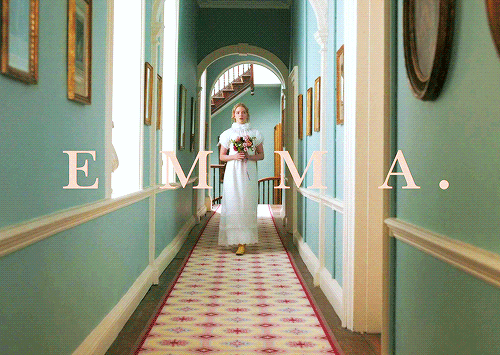
94%. I really liked this movie!
Might not remember the book very well, but I will remember how much I liked this movie! Might not be perfect, but it’s highest scorer so far this month! Granted, does that mean I like it personally the most? Eh, I just think it’s the best movie, not necessarily my favorite Real talk, Pretty Woman is still winning that fight at the moment.
Anyway, this was fun, but no more Jane Austen for a hot sec. Period pieces, though...I could go for more period pieces...so let’s get NUTS.
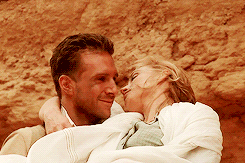
February 8, 2021: The English Patient (1996)
#emma#emma 2020#emma.#emma (2020)#autumn de wilde#eleanor catton#anya taylor-joy#emma woodhouse#johnny flynn#george knightley#mia goth#harriet smith#bill nighy#miranda hart#romance february#user365#365 movie challenge#365 movies 365 days#365 Days 365 Movies#365 movies a year#userrobin#tusereliza#filmtv#ulexi
17 notes
·
View notes
Text
Nachi's Log on Making Webcomics, part 1
People say "Write your stories! Draw your dream comic! Just start your own project!" But we all know shit is fucking hard to do.
As someone whose job deals a lot with managing projects daily, I find their train of thoughts extremely interesting. That is, the hows, the whys of people arriving to certain decision and stuff--on whether to start a project, or to continue doing a project in certain shape, or at one point finally stop pursuing it.
Based on that, I decided to record my own 'train of thought' on making my own passion project, a webcomic, in a somewhat readable format for myself in the future. She'll most likely wonder why the hell the 2021 me took this particular direction of writings.
But, if you, dear reader, think this record is interesting, by all means read this too! A quick disclaimer, though:
This is not intended to be a how-to.
This also does not talk about commercial projects.

The summary of this log, would be...
To my future self reading this log: at this point of time, I finally, finally been able to start the webcomic I have wanted to write since years ago thanks to these deceptively dumb things...
I stopped trying to write shit I don't enjoy learning more of
I found this previously-hidden, surprisingly huge urge to bully my own OCs
I learned some shortcuts that don't make my exert too much effort, so i dont feel like crap if my drawing turned crap [On a separate post, TBA]
Oh yeah, also to my future self? This is gonna be a long read.
As a context, a few days ago I finally uploaded the first page of my comic, a comedy story about a girl thrown headfirst to people with their Indonesian folklore-inspired superpowers--aptly named What The Folk. I took inspiration from traditional folklores like Timun Mas, a girl that killed a man-eating giant by throwing some stuff. I like these kind of things.

This story did not start this way six years ago though. It certainly was Not titled WTF when I was like "oh shit... what if.. girls... but folklore powers" for the first time.
It started with totally self indulgent me drawing the Timun Mas as a cute girl with a fucking gun, eight years ago. For reasons.
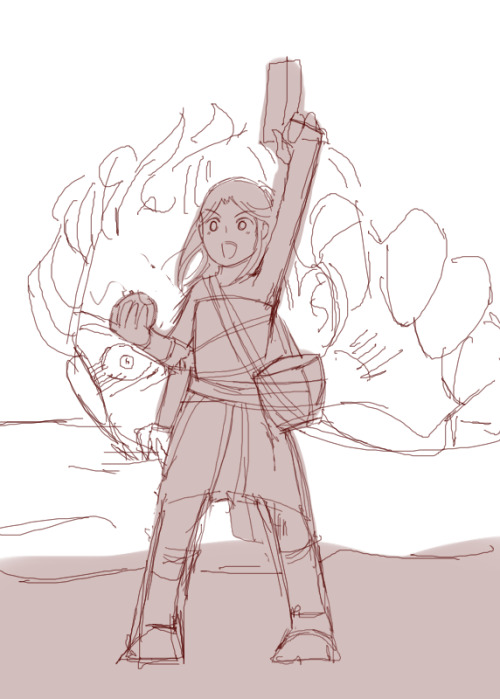
Oh, if you haven't noticed, the aesthetic was also very .. Indonesian, by the costumes of the characters. A plural, now, because I wanted to adapt what's basically Timun Mas folklore to action-packed comic.
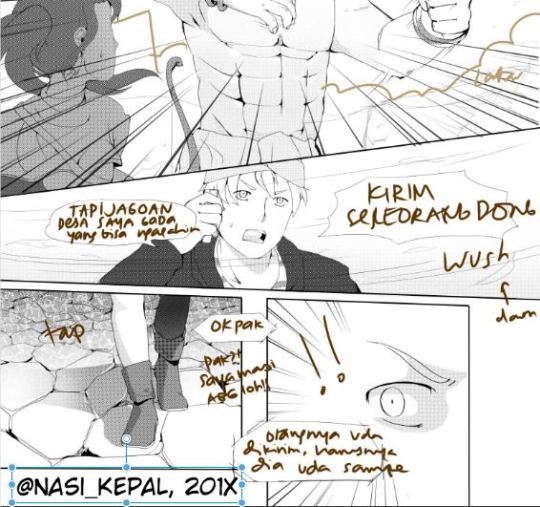
Extremely cool in premise. Anyway, for some reason, 2016-me onwards decided, nah, I'm not writing a cool battle-inspired folklore story. I'm gonna write a gag comic in modern Indonesian setting, and while they fight shit with cool-looking folklore inspired powers, the focus is more on the stupid shit they did to fight enemies.
Stop stop stop right there. Wait, what? It goes from serious battle story to a gag action? What fuels this sudden tonal and aesthetic shift?!
Here's a further detail on my decision.
1. I stopped trying to write shit I don't enjoy learning more of

Okay. Battle stories usually feature badass fights, of course it's the part of the story!! You know, like shonen manga.
It took me like four years of trying and failing to draw what i have on my mind, to acknowledge that, crap, I don't actually enjoy making stories about people punching the lights out of others. I don't actually enjoy learning how to make my fights cooler than ever. I don't feel happy when I have to choreograph fights. I like Jojo's Bizarre Adventure not for the lightning barrage of punches, for goodness sake, but the sheer ridiculous-genius of the asspulls on the fight!
With some reflections, maybe the thing that made me really hard to acknowledge this was the attachment to the idea. Because I was "the first person who thought of this idea, so only I can draw it". While there's nothing wrong with attachments, it is a problem if I myself don't even like writing this idea I'm attached with.
So, what do I like, then?
Parodies. Comedies. I find immense joy if I can find the perfect punchline from what is considered 'Canon'. (Also I won't let anyone say comedies are inferior than battle stories. Those two require different skillsets.)
Campus environment. College was one of the most interesting years of my life to date, and I want to share the little tidbits like me eating campus' street food. Really mundane, but it's where my heart is.
Part time job shenaningans. My days as non-permanent worker is just too eventful not to adapt to my OCs.
When I decided to scrap absolutely Everything beside the folklore powers and the basic trait of said characters, then start adding ultra self indulgent things, writing becomes so. Much. Easier.
When I go with this strategic decision, I was plagued with doubts, though:
Others might be using this idea then! Not you! And so what? There are no two same thoughts in this world. If one coffee shop AU with one pairing can evolve to various takes on this idea from multiple authors, why not this particular idea, too? No one can write what you can write. Nachi, you need to take pride of your own flow of thoughts and strengths.
Won't they look cooler with traditional Indonesian inspired aesthetic instead of modern place? It might look cool on concept, but you don't like drawing it. Also, it will look insincere. Drop it.
What about the scrapped ideas? Fuck sunk costs. I compiled them on a separate masterpost I can look back if I'm stuck in the future. But that's for the future, I'm not dealing with that now. Bye, bitches. You made me stuck in a limbo.
This decision to start anew goes hand-in-hand with the 2nd point, the newfound desire to.....
2. I found this previously-hidden, surprisingly huge urge to bully my own OCs
Because I was too focused on getting the events and battle panels right while felt agonized, I didn't even care that much about the characters!!! And when I go to the much enjoyable road of comedy, this requires me to actually think about the characters. My OCs.
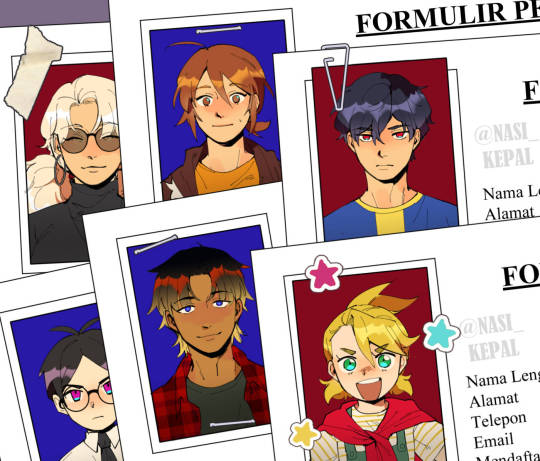
They are a delightful mess. I love them. I want to put them to frankly frustrating or confusing situations for the funsies.
I start thinking more of their dynamics. Wrote their background and stuff. Wrote their favourite genre to sing karaoke of, I swear it's fucking fun. Why wasn't I doing this sooner? Oh yeah, the attachment to initial ideas. I swear....
This newfound direction and motivation of my webcomic is further moderated by a very, very determining factor. The technical stuff involved in drawing the stories. The making of actual comic, beyond the storyboard.
As I will talk a lot LOT more, I decided to continue this particular topic on a separate post.
Ending Ment for Part 1
Looking back, I felt happy I finally are able to overcome the stupid roadblock. It can come sooner, yeah, but I don't really regret how it come after years of agony. Funnily.
8 notes
·
View notes
Text
Anime Newbie in her Twenties Ranks her First 10 Anime
With the recommendations of my sister @ging-ler and friends, I started watching anime just over a year ago and within that time I’ve watched a total of 10 - some clocking in at almost 200 episodes and some with only 12. I told myself a while ago that once I had finished 10 anime shows I would rank them like some Anime Newbie WatchMojo list, so, here we are. Really this is just an excuse to force more of my unwarranted opinions onto unwilling followers.
I should also preface this by saying I don’t think any of the anime I watched this year was bad, and I enjoyed a lot about every show even if I ranked some low. However, the top three anime on my list are the ones I would recommend to anyone following me even if they don’t watch anime.
10. Death Note

Despite absolutely loathing the “protagonist” since episode one, I really enjoyed the first half of Death Note! The story was intriguing with all of its wild twist and turns and I found myself immediately invested in what was going to happen next. Unfortunately, after the death of who I thought was by far the best character, the show seems to go off the rails as it introduces new characters and contrived plot devices in the second half that were frankly hard for me to care about at that point. The ending was satisfying but I forced myself to sit through a lot of painful meandering to get there.
9. Cowboy Bebop
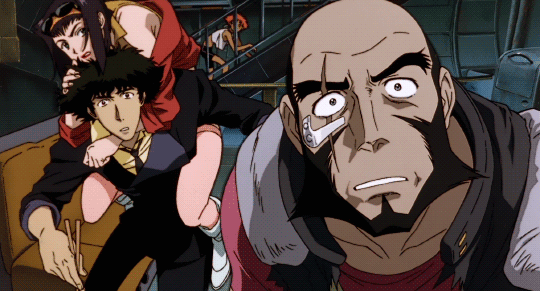
Cowboy Bebop was the first anime I watched as suggested to me by @mcsherrybr. The smooth and jazzy art, atmosphere, animation, action, and music were all a lot of fun, as were the lovable ragtag group of misfits that made up the main cast. I enjoyed myself a lot while watching this western/sci-fi melding pot of a show, and I only ranked it so low because the last few episodes were a huge disappointment to my found-family-trope-loving heart.
8. Violet Evergarden
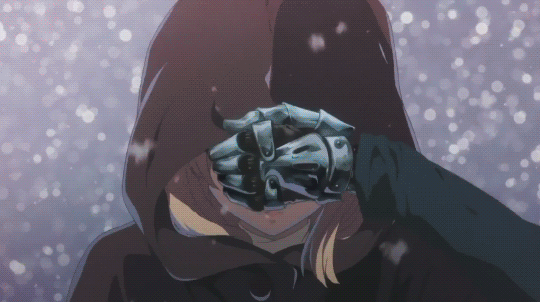
Violet Evergarden, following the story of a child soldier learning to love, is absolutely beautiful to look at and listen to. The music in this anime is, for me, THE best music from any show on this list. This is also the only anime that made me sob several times while watching it. The collection of short episodic stories that explore the deep facets of human love and connection are incredibly resonant and will stay with me for a long time. However, the strength of the small story arcs made the rushed overarching war story and finale weaker in comparison. Similarly, the memorable characters introduced in the one-off side plots were more interesting to me than the cast of rather bland reoccurring supporting characters. While I will remember a lot of great individual moments, I can’t seem to remember a single character’s name besides Violet’s, but that might also be due to being one of the shorter entries at only 12 episodes.
7. Hunter x Hunter (2011)

Going from one of the shortest anime on this list to the longest, Hunter x Hunter was an great and engrossing story during the entirety of its 160+ episodes. It’s colorful and playful, but can also be very dark and at times even heart-wrenching. Because it contains so many distinct arcs, there is a wide variety characters and stories to get attached to, and some, like the Chimera Ant Arc, I even cried over. But this also left me with issues regarding the pacing. The show has great action and introspective moments but will often drag with long drawn-out pauses between fights to explain simple concepts (though I understand that’s a common trope in old shonen anime in general). The world-building is rich but also caught me off guard with some strange ideas, and admittedly not all of them I liked. Some eccentric characters and concepts rubbed me the wrong way and ended up hindering my enjoyment of the show. Overall though, it was a lot of fun and I left with a few more endearing favorite characters, like Leorio and Killua.
6. Erased

Also a 12 episode anime, Erased was amazingly impactful for how short it was. Even as I followed the unfolding murder mystery, I was also touched by the meaningful themes and kind-hearted characters I met along the way. The already-strong story is accentuated with great symbolism, art, and music. The only problem I had was with the mystery itself; I was able to tell who the true killer was within the first 4 episodes, which didn’t lend itself well to suspense and I spent the remaining episodes frustrated that the main characters couldn’t see some obvious clues.This is a minor problem, though, since the finale has less to do with mystery and more about the morals and resolution of themes that I felt was satisfying.
5. Demon Slayer
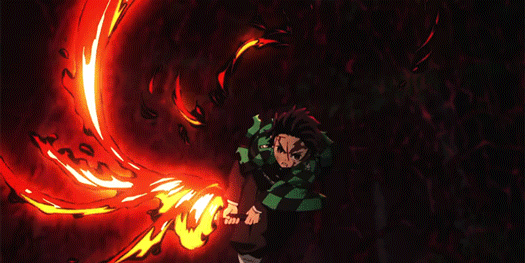
Demon Slayer is gorgeous. The stunning art style, fluid animation, and breath-taking music are all valid reasons to watch it, but the main character Tanjiro and his unwavering devotion to find a cure for his sister-turned-demon Nezuko are the reasons to stay. Tanjiro is unbelievably gentle as he shows even the evil demons he has to slay a hard-fought kindness, and it’s those tender moments between all of the amazing action sequences that really elevate this show for me. The issues I have lie with the rest of the cast. While I love some supporting characters, like the pig-headed Inosuke and the stoic Giyuu, others have very niche personalities that can get annoying if they’re on screen for too long, which they definitely tend to be. Still, the bond between Tanjiro and Nezuko is so strong that it gets me through even those dragging scenes.
And it’s written by a woman!
4. My Hero Academia

Hey so this might come as a shock for anyone who’s followed me for a while: My Hero Academia is not my favorite anime! I do love it a lot - it’s the only anime on this list that has inspired me to read the manga, write fic, and buy merch. There are so many lovable characters and exciting arcs in this show that there is bound to be something for everyone to enjoy, both inside and outside of canon. It’s a wonderfully paced and animated deconstruction of the superhero genre and besides its deeper themes and commentary, there’s also just a lot of endearing teenage goofin’ to be had, and the show balances the tone of these two almost-equally engaging aspects of the story fairly well.
The downside, for me, is the show’s sexualization of female characters, especially the teenagers. With the likes of pervy fellow classmate Mineta, it’s a flaw that’s hard to avoid and takes up an unfortunate amount of screen time. There are in-universe characters that protest against this behavior, and the female characters are still well-written for the most part, but that doesn’t make up for the canon material including it at all. It’s not a huge part of the show but it’s present enough that it really knocks the ranking down for me.
3. Fullmetal Alchemist: Brotherhood
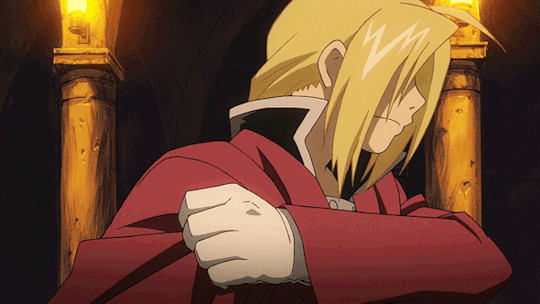
Out of my top 5, Fullmetal Alchemist: Brotherhood is the only one that is complete. Because of that, I can tentatively say that so far, it is the best completed story on this list. From beginning to end, the pacing was perfect - the action never dragged, the characters were never unnecessary, and the plot twists were never unearned. I found myself more invested than I thought I would ever be for the large cast of characters, and everything, including its ending, was satisfying to watch. The animation is fluid and lent itself well to the most impactful scenes, especially involving the flame alchemist Roy Mustang. It’s also written by a woman! Really, the only nitpicks I have were with tonal problems - serious moments would sometimes be ruined by too much slapstick or visual gags.
As I mentioned before, my Top 3 are shows I would recommend to anyone who’s unfamiliar with anime simply because they’re good solid stories with almost no distracting anime tropes. This is a good place to start.
2. The Promised Neverland
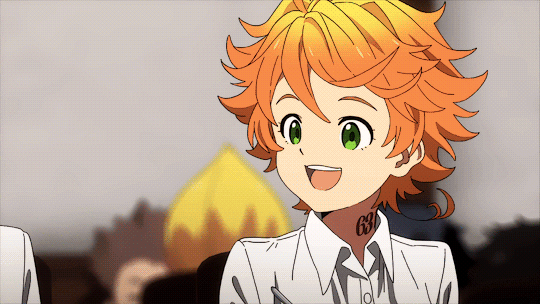
The Promised Neverland is deceiving; on the surface it looks like a sweet show about a bunch of adorable kids playing together in the spacious green backyard of their quaint orphanage. Once you finish the first episode, however, you will quickly discover that there is definitely something more sinister lurking under the surface. This show is an expertly executed dark horror/thriller that always had me on the edge of my seat. The cute aesthetic never distracts from the suspense, in fact, it adds to the discomfort when the horrific visuals and expressions are contrasted against the character designs. I loved all of the characters, including the antagonist, who manages to be just as sympathetic as she is menacing. The sound design and music are also beautiful and adds so much to the rich atmosphere. I am definitely excited to see where this series will go!
1. Mob Psycho 100
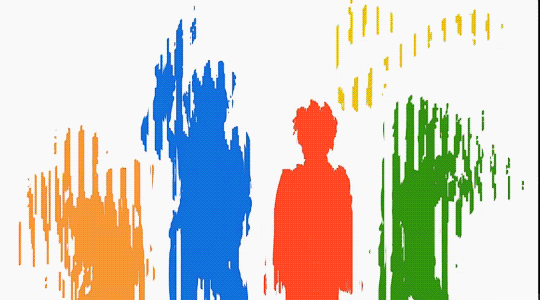
ONE, the creator of Mob Psycho 100, said the single word he used for the concept for the series was “kindness”. Kindness shines through so much of this story following the life of Mob, a super-psychic kid that just wants to fit in, and I adore every second of it. While many shonen anime stories force the child protagonist to get stronger, become more powerful, and fight in battles against hostile adults, Mob Psycho 100 says “that’s stupid. Kids shouldn’t have to be traumatized by immature power-hungry adults. The only strength that anyone should pursue is strength of character, motivated by self-love and love for others.” And it says it with the most beautiful animation I have EVER seen in a show. The simplistic character designs mean the animators can have as much creative freedom as they like with expressions and movement, and they absolutely use that freedom. Humor is a large part of this mostly-comedy anime, but it makes the serious and introspective scenes so much more important when they do happen. The shifts between these two tones never feel awkward or imbalanced.
Mob Psycho 100 has inspired me to become more experimental and joy-seeking with my art, as well as just become a better person in my own life, which I can’t say for many other anime or many other pieces of media period. Even though a Season 3 hasn’t been officially announced yet, I can still safely say Mob Psycho 100 will forever hold a special place in my heart.
22 notes
·
View notes
Text
Vespertine by Leta Blake & Indra Vaughn
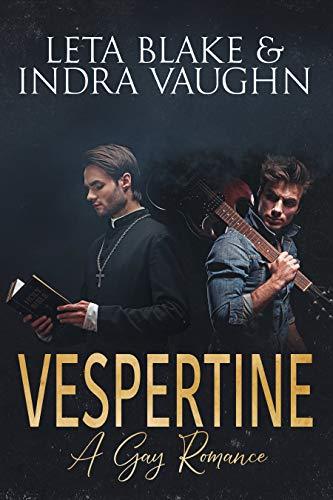
Read time: 3 Days Rating: 5/5
The quote: Your skin tastes of ocean and sin Your lips sink me like ships In a wave that holds on so strong It’s impossible to sail on — Nicholas 'Nicky' Blumfeld
Warnings: drug use, suicidal ideology (past), death, lots of biblical references, addiction
TL:DR. This is a brilliant book that I recommend to lovers of the genre it has some unique character moments and is just well written. Things to look out for if you decide to try reading this, drug use, suicidal ideology (past), death, lots of biblical references, addiction. Some are minor some are more common.
Here we go. I have never read anything quite like this in my life. I've read forbidden love, I've read addiction and I've read back in town. But I've never read them quite like this with religion, music and high stakes. It is worth saying this is a book that starts with a bang, in the first chapter there is major drug use (voluntary and coerced) to the point of overdose and holy speech running side by side. That is how the book continues with the colliding and melding of worlds sometimes with ease sometimes jarringly as is required. The burning question of Verspertine is what price love? What are you willing to pay for love?
I'm going to be honest and say this is a book with a fairly predictable endgame for those who have read the genre at least. The signposts start appearing and seeing where it is going is not difficult. But it's not about that it's about the characters and the journey. Nicholas Blumfeld is known to the world as Nico Blue, to his friends as Nicky. He is the guitarist and lyricist of the successful band Vespertine. After an overdose on tour, he has returned to his childhood home to get clean and find out who he is clean. His emotional tone throughout Vespertine is shown through song lyrics that appear sporadically. Between the ages of 9 and 17 Jazz and Nicky were inseparable, Nicky never knew why Jazz entered the seminary, never understood a lot of things it left him angry. That anger has fuelled his entire career. Jasper Hendricks, known to the Little Heights community as Father Henricks and Nicky as Jazz is a Priest with a sweet tooth. At seventeen he followed his calling and joined the seminary becoming the Priest in his childhood hometown. His pride and joy is Blue Oasis Center home for LGBTQ+ youth. When Nicky comes back Jazz is thrown, their confrontation is in a place it shouldn't be. Jazz starts questioning his path, his choices in life. His place on the path is shown by the appearance of the church. As characters I really like them I like their dedication to their truths, their paths. The characters are delightfully different for having come from the same place. The way they were written made me want to cry for both of them more than once. Their yearning, shown well with Nicky's flirting and Jazz's staring wasn't ended at the right place. They both knew they were playing with fire, they just couldn't stop. Their coming together each time it happens it tonally perfect, each time feels right and the right one is leading. From the sweet to the hard and desperate. Some of those scenes in other books would be absolute no-goes for me but here they just work.
The support cast is largely minimal but what there is used well. Miriam and Adrian, Nicky's parents, are his support but Adrian also has a bit to do with Jasper. Within Blue Oasis Center there is Lizzie. Lizzie is a trans girl who arrives in Little Heights the same day Nicky gets home, their stories are linked. Mrs Wells is employed and the Center but also taught Nicky and Jazz as children, like most of the others in the book she distrusts Nicky and just sees him as a no-good junkie. It's good to see someone like that in close, her reaction feels realistic. The church is represented well by Andrew and Father Thomas. Father Thomas is particularly interesting, he knows Jazz better than he knows himself. The only member of Vespertine we spend any time with is Ramona a badass rocker if I've ever read one, I cannot express my love for her. Her need to keep Nicky clean doesn't just come across as self-interest which feels important. All these characters just want Jazz and Nicky happy, though not necessarily together. Everyone knows that is impossible.
If I try to write a coherent review of this it will be obnoxiously long so we're going with dot points. Of things I really liked and appreciated because there was not much I didn't.
"Mom I need help." that is just a beautiful line and I almost cried despite its simplicity.
With or Without you in virtually any setting will wreck me. The way it was used in Vespertine was perfect. Acoustic and by people with way more emotional baggage then they can handle And my emotional reaction to that song will forever be blamed on Looking For Alibrandi.
Dizzy the cat and the chaotic humour she induces are fantastic. I did not expect to laugh so hard at the lines “She gives high fives?” “And delivers death to poor innocent bunnies. I’m considering whether or not she’s an agent of Satan.”. But yeah that's Dizzy. Oh and I love the side of Nicky she induces.
Nicky's tattoos are stunning representing his love even though he didn't know it. I was in awe of them in a way. No spoilers on those
There is as expected a lot of biblical and religious quotations and act for the priest but that in itself as an atheist is interesting.
Nicky and his religious journey. He was born Jewish, spent time in the Catholic church as a teen, considers himself atheist but might be something closer to agnostic.
I had to look up Rugelach for my own sanity. It originated in the Jewish communities of Poland and is a sweet pasty. I think I've eaten without knowing what it was called.
I probably should put it here. Nicky is exactly my type when it comes to fictional men. Slightly broken, tattooed and described as "a pretty little bad boy". Look I know my type and FYI Leta Blake writes broken well (I'm looking at you Joel).
I read on a kindle, a kindle that allows me to highlight and make notes as I read. It has been a long time since I made as many as I did for this. There are some brilliant lines about faith, love and life, just as they were in the other books I've read by Leta Blake.
I may be putting Leta Blake on my fave mm authors list I appreciate her focus on character and growth over smut. (sorry to Indira Vaughn who I will look up more books by soon)
#vespertine#leta blake#indra vaughn#book review#tw drug use#tw drug addiction#tw death#tw suicidal ideology#this review is far too long but making it shorter was never going to happen#i loved this far too much#ktreviews#read 2021
1 note
·
View note
Text
A scene from the Cats 2019 film I’m happy they changed
Last time I talked about a scene I wouldn’t change in the Cats 2019 film. Now, I am going to talk about two scenes that were changed, for what I think for the better, based on the talent of the cast. Today is Skimbleshanks the Railway Cat turn. which is one of two songs I believe were changed based on the talent of the dancer/actor/singer rather than for the sake of story. Expect this to be a long read as I go more in depth than I should have.
Like with Mr. Mistoffelees, I listened to Skimbleshanks the Railway Cat first and OMG I was surprised! It was different but familiar at the same time. I thought it was a great idea to have Munkustrap introduce Skimble rather than it being a group introduction. This gave the tonal and musical shift from a group presentation to a personal one. The combination of the familiar musical entrance and the unfamiliar voice gives the audience an automatic take on the character. Skimble is a positive character who may not be around much but is still an important part of the Jellicles.
I actually enjoyed the fact that it was Munkustrap introducing Skimble because it fits what we know about Munkustrap’s character at this point in the film. Not only does this show his skills as a storyteller, it also shows that he has some sort of relationship with his cat. It gives a sense of mystery as we don’t hear his voice until about 50 seconds into the song. I also love how in this opening you can hear the pure joy Munkustrap has in his voice.
Anyway, moving on, Skimbles entrance also drives that mystery. Quick reminder, I’m still discussing the soundtrack not the scene in the movie. His voice is younger yet he obviously has been working on the train for a significant amount of time. He does a back and forth with the other cats until we get to a part of the track that surprised me even more than the introduction and that is the sound of tap shoes. I love it when musicals include tap sequences on their soundtracks. It gives the song life while also giving us a hint as to what the choreography is going to be like. The combination of the tap and the music builds and builds until we hear Skimble taking over completely from Munkustrap for what we can guess is a wild ride. The fact that they deliberately don't change much about the music gives a familiarity about this song. It really felt at some points I was listening to the 1998 stage film rather than a Hollywood adaptation. That’s how much I loved this song and I haven't even watched the movie yet at this point. They didn’t have to put this much effort into this song musically and the fact that they did is surprising.
Now I’m going to stop gushing about the track and look at the scene itself. What I really love about his introduction this time is Munkustrap’s facial expression. He seems so excited when Deuteronomy says who the next contestant is and Munkustrap gives something for the audience to think about. Why does this cat make the Jellicle Protector so happy? I also love how he just shoves Mungojerrie and Rumpleteazer out of the way and they have no problem with it. The two of them go ahead and participate in introducing Skimbleshanks. I want to also point out another aspect about Munkustrap’s character in how he still includes Victoria by grabbing her hand. This reminds us that this is still through her perspective and is grinning when Skimble makes his entrance. However, Munkustrap is still smiling playing into the theatrics that is Skimbleshanks.
I want to talk about Skimbles entrance, the use of practical props and Steven McRae’s performance. I absolutely love Skimble’s entrance. The lighting through the ceiling and the use of practical props gives him the element of surprise as he well ‘appears’. As he sings with the other cats, we get the sense that he’s important because they all join him in the chorus.
Then we get what we got a glimpse of in the soundtrack. Tap dancing. I actually expected what I heard on the track as it was short and okay. It was nothing to sing about. But wow was I mistaken. This is what I meant in the beginning where the change was based on the actors ability. This is also the only change in the entire song. In the stage musical, tap is used in Jennyanydots’ song not Skimbleshanks. I hate to be one of those people, but I really like this change because it drives his character. It is a part of him. This is also where the cinematography is the best. Right after he blows the train whistle we get a clear close up to his shoes that he was also preparing during Gus’ song. It builds up anticipation. When he makes that first step on the wood, we hear an echo throughout the theater because no one is interrupting him. Everyone’s eyes are on him which pushes the fact how important he is and we need to care about him.
The camera benefits this character by showing half of his body with a close up and a close up of his face. Both of these shots show us two distinct characteristics. Skimbleshanks is highly talented and he knows it.Then we get a wide shot showing the other cats coming closer to watch as he gets faster and faster mimicking a train. Then the editing of the camera matches the tap. The amount of build up created by the combination of the music, choreography, and editing is perfect.
Afterwards, we get one of my favorite references to the stage musical. Instead of using trash found in a junkyard, the cats use materials one would find in a theater such as a trombone. This then leads into a seamless transition to the train station. And that transition becomes clearer when we hear metal instead of wood when Skimble is dancing. I’m surprised that it works.
We then have the next stanza or so on the tracks with Skimble singing and I like how it looks like Skimble is staring right at Victoria. Reminding us that this is still from her POV even though this is his song. I also like how they use tap on the rail as a way to punctuate the music because we don’t get that on the soundtrack. Instead of it being a bother, the choreography once again aids in a transition. As for Skimbleshanks, he shows his playful side which carries over to the next location.
We then get to my favorite part of the sequence: the actual train. I think having the train be part of Skimble’s song makes sense. Instead of just telling, he is showing and telling. This is also one of the few times we see full participation from the other cats and the fact they look like they want to be there. You can see the enjoyment in front of the other characters as he explains his duties on the train and you can tell he likes what he does. The only interruption is from a mouse Skimbleshanks finds but that’s the only time it happens.
The next transition, like the one before it, is perfectly done through dance. Also, if you look closely after he finds a mouse, one of the other cats chases the mouse while he is ‘leaving’. It actually took me by surprise when I watched the scene again and loved that detail. However, I can’t tell who that is chasing the mouse.
When we get back to the theater, we get another great use of a practical prop. The drum. It’s hard to hear in a YouTube video (which I used) but if you listen to the scene with headphones when watching the DVD or Blu Ray, you can actually hear the thumps of the drum. The same can be said with Munkustrap in the beginning of the song. Then the song is abruptly cut off when he is kidnapped by Macavity.
Overall I think this version is wonderful and a delight to watch. I found myself often veering of the analysis and more into the technical aspect of the song. Which I think I did anyway. I even rambled on about how amazing this version is. But what does this do to his character? We aren’t really given much time with Skimbleshanks other than the Jellicle Ball scene. No background interactions. Nothing. This is basically a case where the audience needs to pay attention or else they may get lost. In the stage musical, the audience is given background interactions between characters. In the film, we don’t have that pleasure.
From this one scene alone, we understand that Skimbleshanks is a respected cat that probably isn't there all the time, he works on the railway, everyone likes to listen to his stories about the railway, and he is a talented dancer. He is playful but knows when to be serious. He has everyone’s attention, knows he’s talented, and wants to be reborn. Do we care for his reason? Not really. At least I don't think so. It’s also the case where the casting benefits the character. If it wasn't for Steven McRae’s performance and talent, we probably would have been given a different Skimbleshanks. He gives us a character so full of life and different from the other Hollywood/Veteran actors in the film. His performance gives a sense of positivity and fun. You can also see he's enjoying himself which can’t be said for some of the other Hollywood/Veteran actors. When researching, I learned this is McRae’s first film and it doesn't show at all. If you want to watch a perfect example of McRae’s talent, I highly suggest watching his performance as The Mad Hatter in Alice's Adventures in Wonderland – Mad Hatter's Tea Party.
Even though this version of Skimbleshanks and his song are amazing in their own right, I still found that I wished for more. Maybe he could have had more interactions with the other cats before the Jellicle Ball or some spoken dialogue between him and Munkustrap. Or at least have dialogue after his performance between him and Old Deuteronomy before he gets Catnapped by Macavity. Unlike with the Jennyanydots, Bustopher Jones and Gus, we don’t get those interactions or dialogue. It’s almost as if his character didn't deserve it yet was given the freedom to give a kick ass performance. I also hate how his song is basically cut off for plot's sake. Like I understand, that’s how it is in the stage version, but it seemed as though it was cut off in a way that didn't seem natural. In the stage version, the song is given a bit more time on stage as a way to brighten the mood before Macavity takes Old Deuteronomy. Here it seems sudden and unnecessary.
Like the others it's not perfect, but I would definitely suggest a friend to watch this scene, Mr. Mistoffelees, or Gus the Theater Cat over Bustopher Jones and Gumbie Cat any day.
#i finally did it#scene analysis#character analysis#cats#cats 2019#2019 skimbleshanks#2019 munkustrap#2019 victoria#skimbleshanks the railway cat#steven mcrae#movie musicals#i feel like I rambled#cats the musical#I feel like I ranted about everything#I'm sorry if you don't agree#long post
27 notes
·
View notes
Note
no pressure if you're busy but i was wondering - is titans good? or is it more a show where you're like it's not /good/ but i like it? i thought it looked interesting but then everyone was so negative about it i kind of got put off. And then your (really excellent btw) video resparked why i thought it'd be interesting to watch in the first place. thanks!
I haven’t paid a ton of attention to what fans have said about Titans, although I’m aware that there’s a general negative vibe around it. I suspect that whether Titans is worth watching for you depends a whole lot on what you want out of Titans.
I went into the show having never read a DC comic in my life. I was coming off of a week-long Wikipedia binge on Batman and his associated characters—the Robins, the Batgirls, some dude named Signal—and was talking to @thirdblindmouse about how it had become overwhelmingly clear to me that we’ve been doing Batman all wrong for decades, and the way to tell the story is as an ensemble family drama about intergenerational trauma. And she was like, “Uh, have you seen Titans?” So all of my pre-existing understanding of the characters comes from Google and selected comics scans.
I suspect that the show’s interpretation of Dick Grayson, in particular, is... skewed? I’m almost certain, based on scans of comics I’ve seen/the half a season of Teen Titans I watched a lifetime ago, that its interpretation of Starfire is highly nontraditional. There are certain storylines that I know they’re adapting, but like, they are playing very loose with the adaptation of even some of the characters’ basic personalities. (I’m pretty sure—again, not really a DC comics fan!)
So if you’re very committed to a generally cheerful Dick Grayson, Titans will not give you that. If you have a vision of Batman as a generally decent man, Titans will really not give you that. In general, I think that the show would be better if it erred more towards a lighter tone for Dick—there are moments where he has shades of Quentin in season three of The Magicians, when Q was kind of endearingly hapless, and the show is better for it. But I think it earns its ambivalent stance on Batman, and uses it well. Batman in Titans looks and acts like your dad whose office you’re not allowed into. And Titans!Starfire is really amazing. Like, Anna-Diop-is-a-revelation, fuck-now-you’ve-got-me-shipping-against-my-will amazing.
The bigger issue that Titans has—and this is not unrelated to Dick’s characterization, I guess—is its relationship with violence. Titans is a really violent show, especially in its first season, and it’s off-putting. Pretty much every superhero show involves the heroes beating up bad guys; not every superhero show involves the protagonist mutilating someone in the course of a fight.
This is not unthinking hyperviolence. Titans (which is actually annoyingly pretty good about tracking character through action sequences) is trying to make a point: The compounding traumas of Dick’s childhood resulted in an explosion of rage. Batman funneled his anger into Dick; Dick funnels his anger into whatever bad guy he’s fighting. The show isn’t subtle about this idea. Dick says it out loud several times. Nor (after the first fight) does the show endorse Dick’s over-the-top violence. Everyone from Donna Troy to Dick himself remarks on it with, at minimum, concern. And over time, Dick’s fighting style changes; he consciously leaves the hyperviolence behind, until his final fight of season two is primarily evasive.
But Dick is not the only Titans character who is working out his rage on the criminals he apprehends, and the show is considerably less coherent in its tonal approach to other characters’ violence. Hank and Dawn—the masked hero team Hawk and Dove—have an origin story that plays out like the the backstory of a serial killer couple, their interlocking trauma and rage and grief finding expression and acceptance in each other. The show is aware of the dynamic, but it’s not clear that it’s aware of how disturbing it is. Hank and Dawn are, primarily, people who need to cause violence in order to be at peace in their own heads—and only secondarily, people who want to protect others from danger. Season two does do some work exploring this idea, but the exploration is confused by the fact that, in the end, the show wants both of them on the cast.
Which is kind of the problem with any superhero show that sets out to explore the ethics of superheroism—at the end of the day, the characters aren’t gonna retire to Wisconsin, you know? So Titans presents hyperviolence, presents it as problematic (sometimes), presents it as almost an inevitable consequence of traumatized teenagers deciding to pursue vigilante justice... and then builds a superhero team of traumatized teenagers and young adults. As is its basic conceit.
And on a more fundamental level, the hyperviolence just sort of makes the show feel very grim. It’s already an aesthetically dark show, a lot of the time, and then you’ve got people getting mutilated, and Batman’s an asshole and Dick Grayson’s got anger management issues, and it feels like the show’s grimdark.
I don’t think it is, though. First of all, despite everything, Titans actually has a sense of humor, both in general and occasionally about itself—I mean, it’s not Legends of Tomorrow, but it understands how to crack a smile every now and then. (They have a superdog. He shoots lasers out of his eyes!) But more importantly, at the end of the day, Titans is hopeful. Yeah, it’s a show about anger and violence and intergenerational trauma—but it’s more specifically about moving beyond those things. At its heart, it’s about being a better parent to your children than your parents were to you.
That central relationship between Dick and Rachel—Dick trying, and sometimes failing, but always caring and trying to be better for Rachel, and Rachel’s absolute fury with him when he fails, but her unshakeable devotion to him for being there, the unbelievable amount of sway he holds in her world—that’s what makes the show work for me. There are other vital relationships, too—Rachel and Kory, especially, but also all of the pseudo-familial relationships built up between all of the characters—but it all comes back to Dick and Rachel.
I mean, it’s a found family show. So much so that in season two, there are like, three separate speeches about how this is a family, not one of those stupid biological families, but a family we found, and isn’t that the important kind? And how grimdark can a found family show really be?
The other thing that might throw some people off—but which is actually one of my favorite things about the show—is the structure. If you take a look at the Titans episode list, you’ll see that roughly 75 percent of the episodes are named after a character or characters. Season one of Titans is basically about Dick, Starfire, Gar, and Rachel (Raven from the comics) traveling the midwest, picking up the people who will eventually form the main Titans team. When they encounter those people, they get a spotlight episode. So in episode two, “Hawk and Dove,” when Dick and Rachel lay low at Hank and Dawn’s, the episode starts out with an extended cold open, entirely disconnected from the main characters, just introducing us to Hank and Dawn as characters. Episode eight, “Donna Troy,” sees Dick go to visit his old friend Donna in Milwaukee, and... basically just hang out with her for half the episode, while the rest of the cast does plot stuff. Occasionally, these spotlight episodes stop the plot completely: Towards the end of season one, an episode ends on a cliffhanger. the next episode, rather than showing the outcome of the cliffhanger, is “Hank and Dawn,” an episode that flashes back to show the story of how Hank and Dawn met and became masked heroes. (There’s an in-episode device that eventually makes it clear why this story is related to the cliffhanger.) Season two uses the cliffhanger-into-a-flashback-spotlight-episode structure two more times, once with a character we’ve never met before.
I can see this being deeply frustrating to a viewer watching week-by-week (and I would not recommend watching Titans in that manner). And it’s certainly an unconventional way to structure a season of television. But honestly? I think it’s half of what I like about the show. The spotlight and flashback episodes are good—often some of the best the show’s produced. They don’t stop the plot for no reason; in season two, in particular, they provide context and backstory and characterization in a way that would be almost impossible to do, or to do so well, without the space of a full episode. They make the show more episodic than it would otherwise be—always a joy, in a television landscape full of 10-hour movies—and give it space to experiment with tone and genre. They make the characters richer, and the relationships more complex.
Does it slow down the plot? Absolutely. But Titans is not overflowing with complex plot, and I don’t really think it should try to. The plot of Titans hangs together juuuuuuuust enough to make the themes and characters and relationships work. It’s coherent—we’re not talking Teen Wolf, here—but it’s not brilliant, and honestly, that’s fine by me. But I suppose if you want your plot to be really good, this may not be the show for you.
Finally, I’ll say that Titans, though not what I would call a feminist show (it has a primarily male writing staff and I think it shows) does have a kind of surprisingly large female cast? I wanna say it’s five men, five women, by the end of season two? (Yeah, it’s a fucking enormous cast.) And the women have actual relationships with each other, ones that the show puts some effort into maintaining and remembering. I realize this is damning with faint praise, but honestly I’d just expected a show like Titans to not do that, and was prepared to ignore it, and was kind of pleasantly surprised when I didn’t have to.
In summary: I told my sister that Titans is 10% men in spandex standing on cars, 30% team as family, 30% intergenerational trauma, 20% an uncomfortable relationship with is own hyperviolence, and 10% Krypto the Superdog. I think that tracks. That show, despite having Anna Diop’s glowing presence, has a lot of flaws, but it also really worked for me on some soul-deep level. I am exactly on its wavelength.
I do not think that Titans is a fantastic television show, but I also don’t think it’s a very bad one. I think it’s generally competent show that is very interesting in some aspects, is weak in some areas, falls prey to some inherent trappings of its genre, is thoughtful about familial trauma, is not thoughtful enough about violence and criminal justice, has a lot of very compelling performances, is really poorly lit a lot of the time, pays a lot of attention to its visual language, kind of thinks Batman’s an asshole, and has Krypto the Superdog. It really worked for me; I can see why others might not be into it; it might work for you!
#thank you for giving me this opportunity to talk about titans#a show that has EATEN MY BRAIN#titans#meta
7 notes
·
View notes
Text
Star Wars The Mandalorian: “Redemption”-Review

The Mandalorian closes out its debut season in a finale that is action packed, thrilling, and outrageously fun.
(Review contains spoilers)
youtube
Moff Gideon has The Mandalorian and his allies pinned down. The child has been captured by Imperial scouts and is on its way to be delivered to the enemy. Kuiil has already given his life. It will require quick thinking and grit for the newly minted team to make it out of this situation alive. Luckily for them, they have an assassin droid turned nanny on the way to the rescue.
Although season showrunner and writer Jon Favrea maintains a sole writing credit for this finale, director Taika Waititi’s creative stylings could not be more apparent. Known for oddball comedies that lean heavy on improvisation such as What We Do in the Shadows or his massively successful reinvention of the Thor franchise in Thor: Ragnarok, Waititi may originally seem to be an odd choice for such a climactic hour of television. The stakes could not be higher for our cast of characters and while The Mandalorian has never been a particularly dour show, it is easy to worry that some of the tension so desperately laid out in last week’s installment by Deborah Chow would be lost in the process.
Favreau and Waititi prove to be a perfect match though. Waititi’s experience in comedic direction and also blockbuster action proves to be a natural fit for an episode that runs the tonal gamut and features some knockout set pieces and moments of character driven quiet. He proves just the right kind of deft hand to guide The Mandalorian through these big emotional and spectacle moments and in the process it makes “Chapter Eight: Redemption” easily the strongest episode of the series.
Much of what made “Reckoning” stand out was that a larger series ensemble was finally allowed to exist and breathe. We spent so much of the series following a lone Mandalorian, or I guess we can finally start calling him Din Djarin, and his little child fugitive, that there was a fun thrill to seeing him get to be a team player alongside much of the rest of the cast we have built throughout the season. “Redemption” thankfully gets to build upon this even further. Even with poor Kuiil dead from the opening, Greef Carga, Cara Dune, and Din are all working together as a desperate team with their lives and futures on the line. Waititi mines all three actors for some great character interactions and his skill for ensemble comedy shines here as the different personalities get to butt heads but also shine. Much of “Redemption” sees the crew working together to not only save themselves, but one another by thinking their ways out of tense situations. It does come as a disappointment that as we get to the episode’s inevitable conclusion that so much of this new found group is stripped and scattered and we end with a series status quo that is not much different than the one we created back in the third episode of this season. It represents an unfortunate bit of back peddling by Favreau that can’t help but feel like a wasted opportunity for the future.
It is welcome that despite the incredible stakes present in “Redemption,” that Waititi’s humorous sensibilities shine through so clearly. A cold open following the two bored, incompetent, and cruel scout troopers, played by Jason Sudekis and Adam Pally ,that captured Baby Yoda is absolutely bursting with Waititi’s personal brand of comedy and skill for improvisational dialogue. It has more personality and feels more creatively fresh than almost anything else that Star Wars has delivered this year. Within the span of several minutes Waititi and Favreau craft these two troopers as two confused and nasty grunts that are caught up in the schemes of madmen. They oscillate between sympathy and hatred, and there are few moments as satisfying this episode as when IG-11 arrives to brutally dispatch them.
IG-11. Oh boy, IG-11. The herky-jerky assassin droid has been a treat for this series since the start. His appearance in the first episode of the season was pure action packed joy and voiced with dry practicality by Taika Waititi. “Reckoning” introduced a fun wrinkle that saw this droid repurposed for nannying and personal care and “Redemption” finds joyous, bloody fun in the marriage between the two. I challenge any viewer not to be cackling with glee when IG-11 with Baby Yoda strapped to his chest speeders into town laying waste to all in sight. It’s an incredibly fun and joyous moment that Waititi directs with glee and clear affection.
Unexpectedly, IG-11 also becomes key to Din’s own emotional arc for not only this episode but the series. There is so much packed into “Redemption,” but it all carries with it an almost effortless efficiency. Not only does IG-11’s violent rescue of Baby Yoda lead him to save Din and his allies, but it also provides a smart dovetail to Din’s subplot regarding his childhood hatred of droids. When injured, Din is forced to make himself vulnerable to his droid ally in a way that he hasn’t been able to so far. It makes for a quiet moment of character growth that also allows us to finally see Pedro Pascal’s lovely face, even if it is dirtied with sweat and blood. This moment of rescue and intimacy between two adversaries turned allies makes Din’s sadness at IG-11’s eventual sacrifice all the more believable. IG-11’s explosive end is a heartbreaking moment both in that it’s so rough to see Favreau remove such a strong character from play so soon after reinventing him, but also due to just the amount of joyful personality Waititi has injected into him all season long.
It is a little odd that I haven’t really talked much about Din yet. It is after all his show, but given that Pascal’s often wordless physical performance has carried much of this season, it makes sense that the finale allows much of the supporting cast chances to shine as well. This is far from a bad thing and all the same Din gets a rather exciting and emotional close to his season long arc heading into the future. The mysterious armorer returns to not only finally grant Din his signet, but to also offer him a goal for the future. Just as Din was saved as a child by some roving Mandalorians (who were apparently aligned with Death Watch terrorists which is something that I hope we really breakdown in the future) Baby Yoda is also a child that is lost and is now in the care of their culture. For all intents and purposes Baby Yoda is a foundling and his future is in the hands of Din. Whether he returns the baby to his people, whether they be other “Yodas” or the ancient Mandalorian Jedi rivals, or even raises the baby to be his own child, the two now form a clan of two, which functions as both a fulfilling close to Din’s seasonal arc, but also a fun status quo for the future.
Speaking of the future, Giancarlo Espositio’s Moff Gideon is very clearly positioned as the series’ big bad, at least for the moment. Espositio plays Gideon with a mysterious gravitas that is threatening and intriguing, but so much of the character still remains an enigma. Who this man is and how he knows so much about our heroes is just as much a question as why he wants our little green child to begin with. Oh, and he also happens to be holding the ancestral weapon of the Mandalorian people, the Darksaber. It’s one hell of a final shot for fans of the television side of the Star Wars universe, and it’s frankly surprising that this one of kind lightsaber not only looks so good in live action but makes the leap out of animation at all. No wonder its wookieepedia page has been trending for days now.
“Redemption” closes the book on what has been an uneven, but ultimately fun season of television and does so by delivering an hour of television that is joyous, moving, bursting with spectacle, and just flat out fun. The Mandalorian may not ever be shooting to be prestige television and will doubtfully ever get as strange and contemplative as The Clone Wars or Rebels were at their heights, but Jon Favreau has crafted a new corner of the Star Wars universe that is begging to be returned to. (Thankfully we have less than a year to do so!) It also introduced us to a smattering of new creative voices that bring something exciting to the franchise. Waititi and Chow in particular are clear standouts and should be brought back to the galaxy far, far away pronto.
Score: A
11 notes
·
View notes
Text
Why I’m skeptical about the Final Fantasy VII Remake
I’m skeptical that the remake will be good because there will be a lot of changes that will impact the direction, tone and narrative of the game, and Square Enix’s track record suggests to me that those inevitable changes will destroy and undercut what was special about the original game.
An essay breaking that down piece by piece is under the cut.
There will be a lot of changes
The remake will represent a huge and doubtlessly beautiful graphical update. With these updates, however, comes the need for a variety of new directorial decisions. For example, how should the camera behave during cutscenes? Who should they frame, and how? What will their body language and facial expressions show? Now that all the cutscenes will be voice acted, what tone will characters speak familiar lines with?
Likewise, the game is switching to a third-person, over-the-shoulder view. The original FFVII used a fixed camera and prerendered backgrounds to create a world that felt rich, full, and often cluttered. Every level will require redesign to account for the new way of moving about the world, and the amount of assets required to create the same feeling and to direct your attention in a same way will be exponentially higher. Likewise, there will need to be changes to account for the new combat system, as stages will need to be designed for both exploration and combat in many cases.
The episodic format of the game will necessitate changes to the pacing. Successful episodic games excel at creating self-contained rising and falling action and narrative arcs within each episode. Conversely, Final Fantasy VII was plotted and paced as a single complete narrative. Either the pace and order of events will need to be changed to make each episode stand strongly on its own, or the episodes on their own will be gawky and suffer pacing issues as they are pulled out of context from the greater whole.
Finally, the narrative itself will change. We have yet to see a verbatim line in each of the trailers, so the script itself is being rewritten, and with it many nuances will change. Square has stated point-blank that story changes are on the table. Finally, the compilation of Final Fantasy VII and the various Ultimanias released over the years have added a variety of changes to the narrative and to the lore. The teaser trailers we’ve seen so far have been in-line with the Midgar we see in Advent Children, itself a massive change to the famously ambiguous ending of the original game.
Direction and tone will be affected
All of these changes will not be neutral. In just about every decision of how this story is retold, some things are necessarily going to be emphasized and de-emphasized. Each of these decisions will carry and shift meaning in subtle ways. In that sense, the remake should more truly be considered an adaptation.
Examine the opening of FFVII; a meandering view of the stars fades into Aeris’ face. A single long shot pulls back to the city of Midgar. The tone here is mysterious, and the amount of time dedicated to the environment equals or surpasses the time spent on a character. This direction in cinematography echoes the game’s focus, as it is very much a story about the interplay between the characters as they exist inside of larger, overwhelming forces and environments.
The remake does have the opportunity to give us more meaningful cinematography in its cutscenes, but it may also make directorial decisions that change the meaning or impact of scenes. Especially likely is an increased focus on the characters and the action, and implicitly, the “cool” factor of both of those things, seeing as how the Remake and Square Enix as a company largely foreground great visuals and cool sequences. There’s absolutely room for that, of course, considering the bike scene in the original - but the broader point here is that no intervention can be neutral, and the Remake will inevitably have a different focus from the original.
One influential decision the writers have made is in their audience. All promotional material thus far has been aimed squarely at “returning” players, with no explanations offered for newcomers. What we’ve seen so far is in line with the marketing material - they are not simply trying to recreate FFVII as it was, but also tap into our collective sense of familiarity about it. The direct engagement with an expected audience means they will likely try to recreate the feeling of the experience rather than the experience itself, which would then necessitate certain story changes to keep things surprising or mysterious. This approach will inevitably widen the gulf between the remake and the original game.
SquareEnix’s Track Record
SquareEnix has been behind many beloved games, but they are not the company they were when they released FFVII. Their track record over the past decade, maybe even closer to the past 15 years, has been one of spotty quality, half-baked ideas, poor execution, and a narrative flexibility that suggests a lack of commitment to telling a story with singular vision and protecting the integrity of that story. Whatever your opinion or personal enjoyment of more recent Final Fantasy entries, they objectively lack the clarity and direction that made older entries of this series so beloved. To be completely clear, it is not that I believe these stories could never get there; it is that I’m keenly aware of the fact that they came short.
But more relevant than Square’s entries in the mainline Final Fantasy franchise are the entries to the Compilation of FFVII. These, two, have come with a variety of directorial changes that the new format and technology demanded. They’ve built their own lexicon that will likely be drawn upon in the creation of the remake, and that bring subtle changes along with them. For instance - Advent Children’s visually spectacular fight scenes introduced us to the idea that the characters were all able to leap vast distances and perform acrobatics mid-fight, and we’ve seen this idea carried forward into all subsequent entries of the series, even though it’s somewhat at odds with the more grounded, cyberpunk tone of the original game that earmarked these kinds of superhuman abilities as specifically unusual.
That may seem like a minor quibble, but I would argue that it’s a series of minor changes that have led to the difference in tone and focus between the compilation and the original game, and it comes down to a variety of directorial decisions that continue to be pertinent. For example, in Advent Children, the writing team made a decision to base Cloud’s character around what people would most remember from the game, and decided that would probably be the Cloud that we see at the beginning of the game. This decision was in play as early as his cameo in Kingdom Hearts, and for as inconsequential as it may have seemed then, it’s carried a rippling effect with it. By choosing to write the character in a way that they felt most fans would recognize, they also chose to downplay the growth and the specific quirks that wound up making that character interesting - a repeated issue with many of the characters.
Likewise, because the compilation prioritizes its returning Final Fantasy VII fans, it also tends to prioritize fanservice and recognizable, digestable moments over the overarching narrative of the world of Final Fantasy VII. One memorable example would be a cute Yuffie cameo in the midst of the Wutai War in Crisis Core, a war we are told repeatedly was extremely brutal and which actually destroyed Yuffie’s home and embittered her for years thereafter. The result is a story that’s at odds with itself due to tonal and character inconsistency. The prioritization of a quick moment of familiar joy robs the character of her impact in the long term, and this pattern is repeated for many other characters throughout.
Of course, the compilation has changed more than tone and framing of characters, and has also contributed several ideas to the world of Final Fantasy VII that are now in play. For example, the idea that upon death, people return to the Lifestream, whereby their spiritual energy is used by the planet to create new life. This is a distinctly animist idea that the Compilation has leaned away from, as they cannot cameo dead characters if those characters have since been reincarnate as trees. The compilation has since introduced the notion that a person’s soul and consciousness not only stays intact, but that they can come into contact with the living - an idea that’s fundamentally at odds with the themes of life, loss, death, existentialism and uncertainty that are extant in the original game.
Finally, though not least significantly, Polygon’s An Oral History of Final Fantasy 7 reveals that the reason Advent Children and subsequently the compilation was created was to save Square Enix from financial ruin, not to continue the story for its own sake. It is important to acknowledge the reality that Final Fantasy VII is bankable, and the reason for the remake to begin with may very well be that bankability rather than a good faith intention to retell a story that touched many. The episodic nature of the release does nothing to help that faith, nor does the fact that initial development was outsourced to a third party.
What was so special about FFVII
“So what?” you might ask. Even if there are a ton of changes, and those change the direction and tone of the game, does that really mean it won’t or can’t be good? To that - the jury is out. But I don’t particularly care if the FFVII remake is a good video game - I care if it’s a good representation of FFVII.
I admit without reservation that FFVII is, to use a technical term, anime trash. It has lots of rule of cool sequences that keep the game light, bits of spotty translation, and narrative stumbles. It is not a perfect work. But there is a reason why it was enduring; there was meaning to it, and that meaning was what made it special and unique.
FFVII was a ponderous game. It seldom presented an idea without later exploring and unpacking it. Its characters are seldom what they appear, the mission they undergo is hardly as noble as it seems, and what you expected to happen simply didn’t. It’s rife with deliberate ambiguity and doesn’t work overly hard to explain itself. Its story is shot through with uncertainty, about identity, faith, morality, justice, and every other waymark we use to navigate our life. Its most memorable moments rest in the loss of that certainty, and its most triumphant in the character’s perseverance regardless.
Though FFVII is primarily remembered and beloved for how it made people feel, it wasn’t written to be deliberately provocative or emotionally manipulative. The story was deeply impacted by a real-world loss, and the mandate of the team at the time was to convey that loss for how it truly felt, without the celluloid gloss and tropes like a dying speech that have since proliferated through the compilation. There was an honesty, an integrity and a complexity to this story that caused people to argue in earnest that it was the first video game that could truly be considered a piece of art.
I think the ephemeral nature of these qualities often leads people to conclude that FFVII is mainly loved due to “nostalgia,” but that’s a dismissive take that fails to acknowledge the deliberateness and consistency of its themes and ideas. The same care has very obviously not been given to any of the subsequent FFVII games.
In other words: this was never going to be an easy game to remake. A remake worthy of standing on the same pedestal as the original would require the same careful dedication to thematic consistency and integrity, to tone and feeling as the original. It would require careful thought to the impact and presentation of each of the monumental changes demanded by the new technology and platform.
Square-Enix has yet to do anything to suggest that it is up to this task. I have tremendous empathy for the development team that is taking on this task, but that doesn’t mean I have faith in their ability to really, truly, pull it off.
97 notes
·
View notes